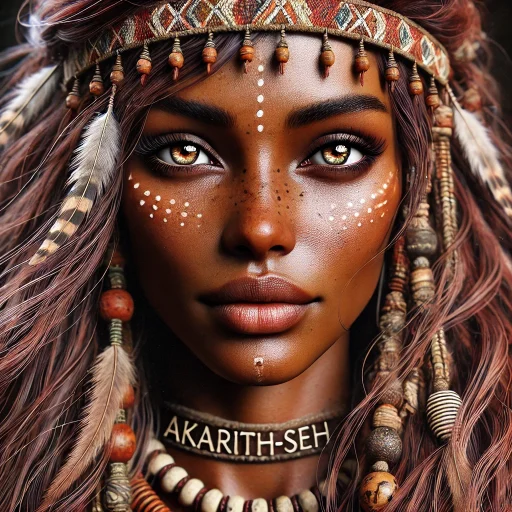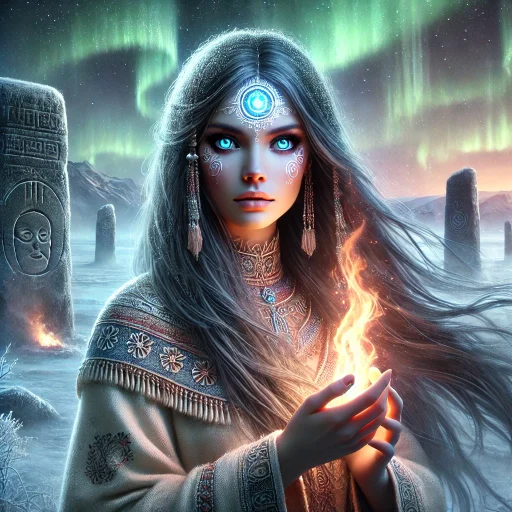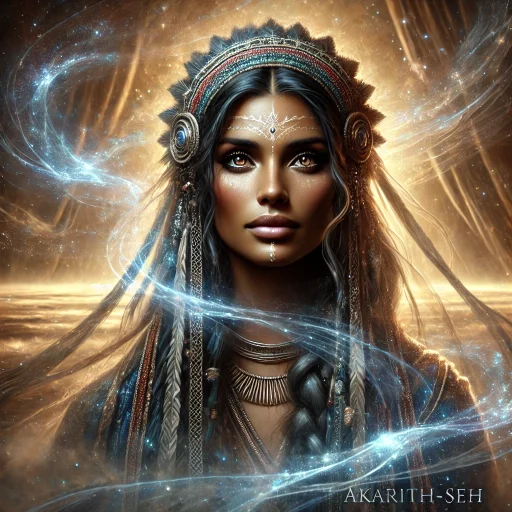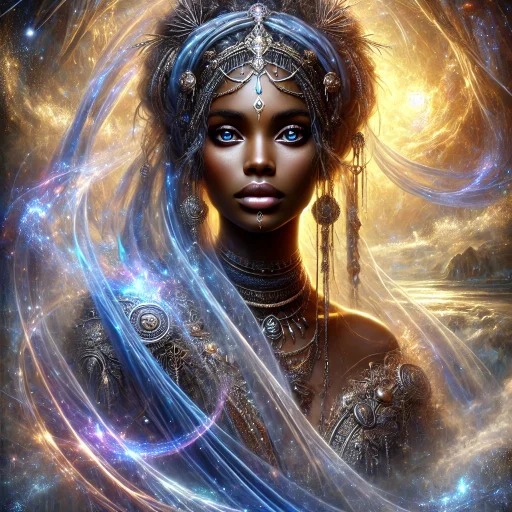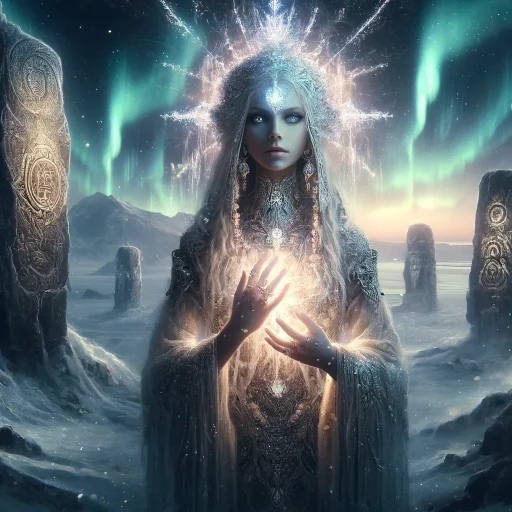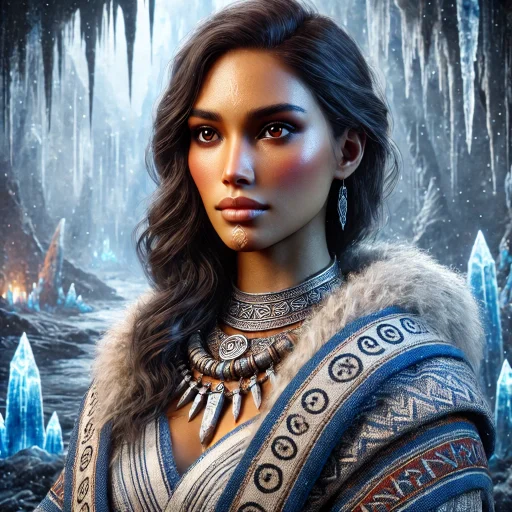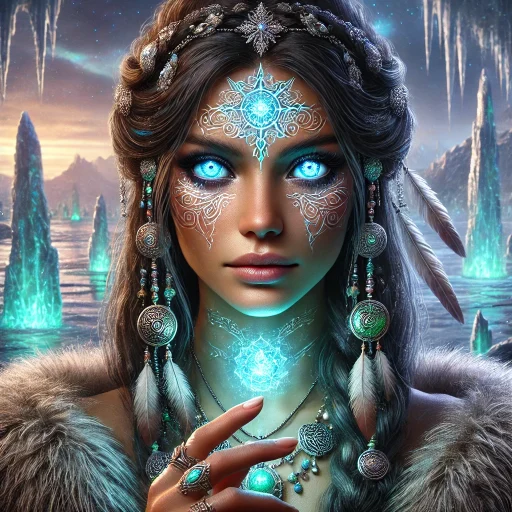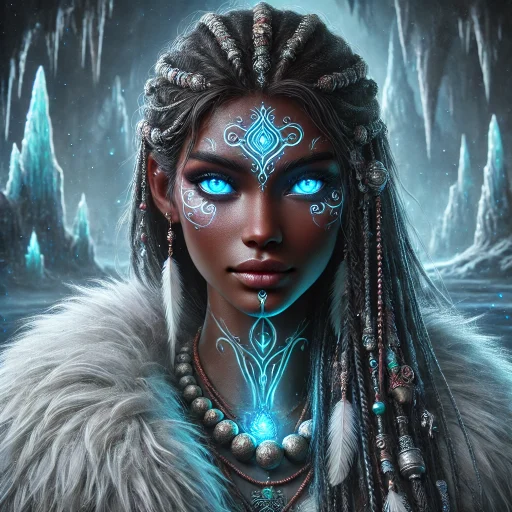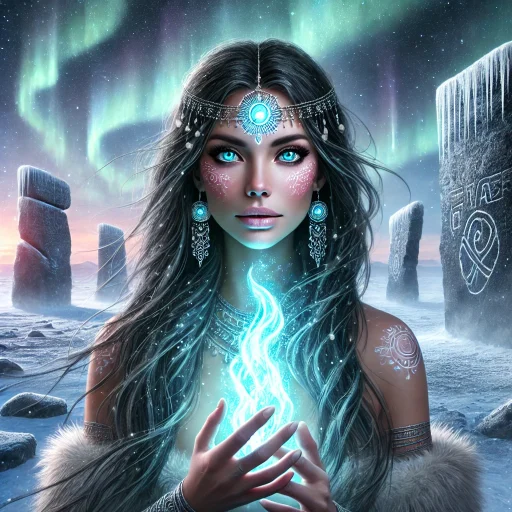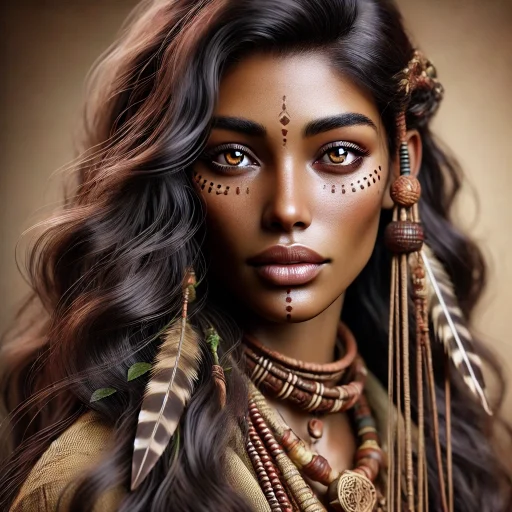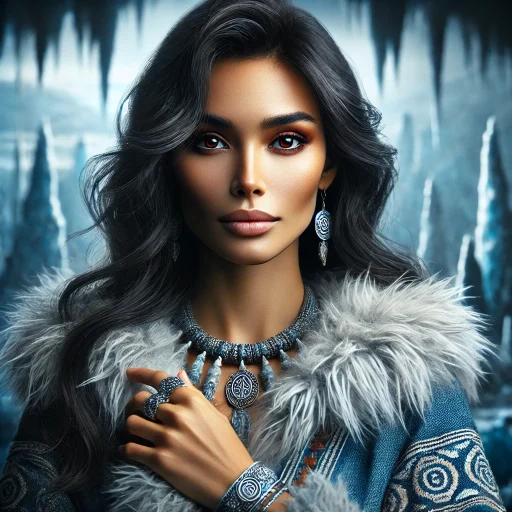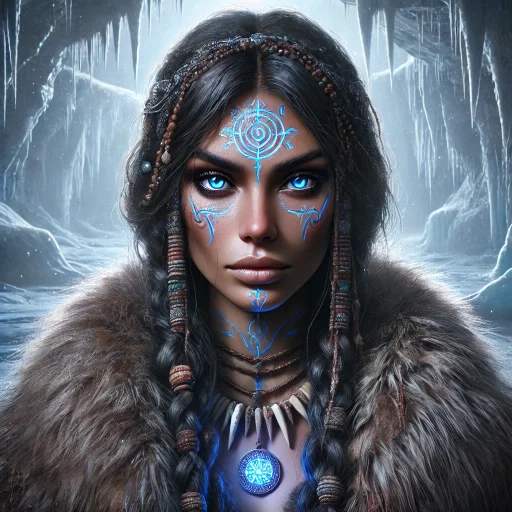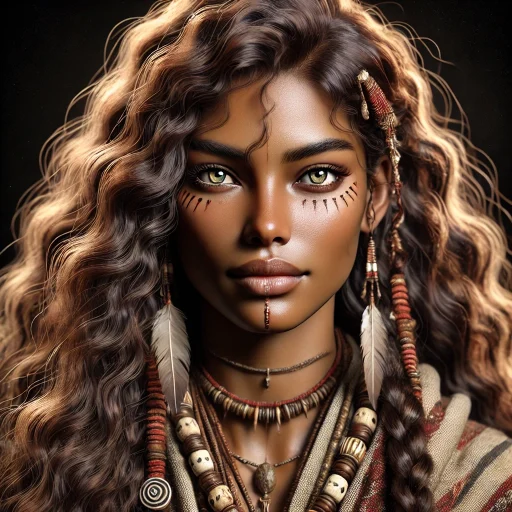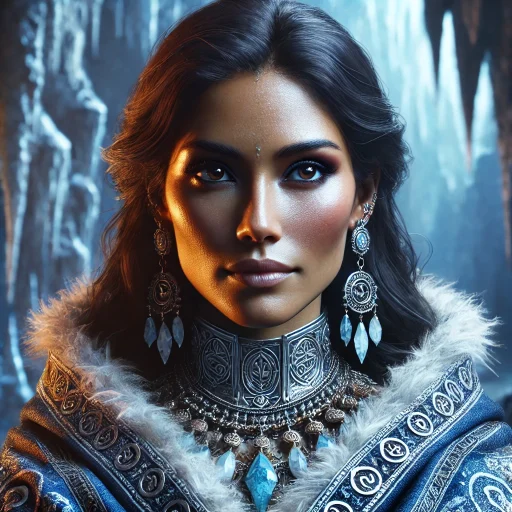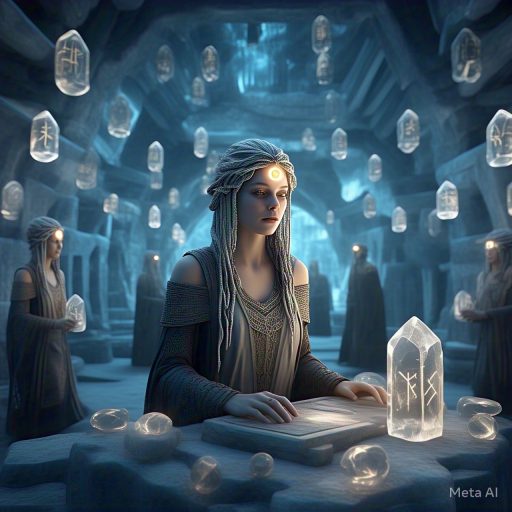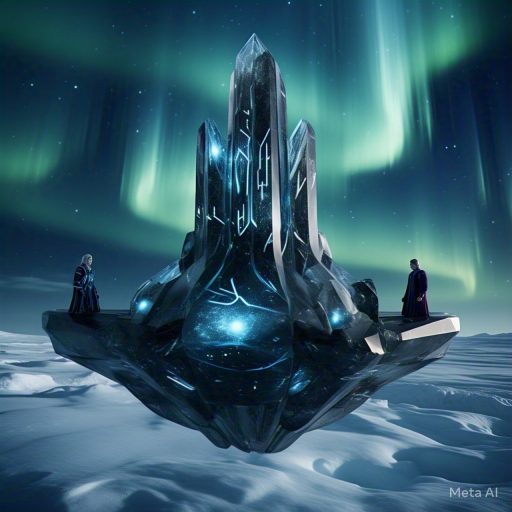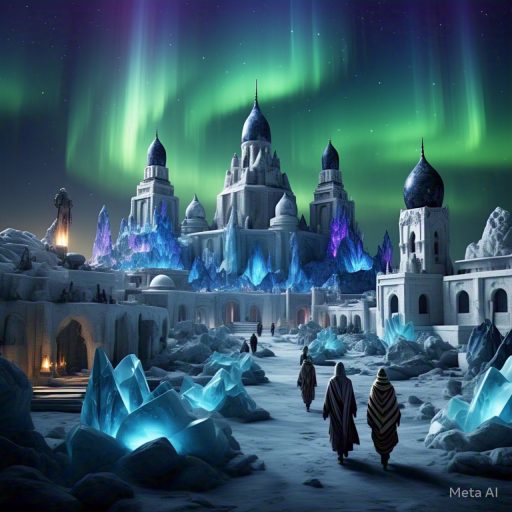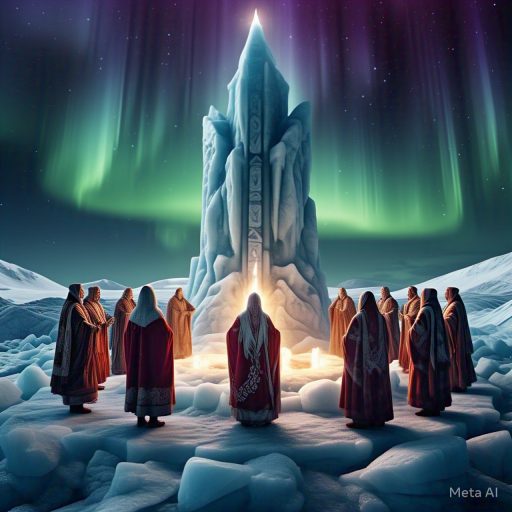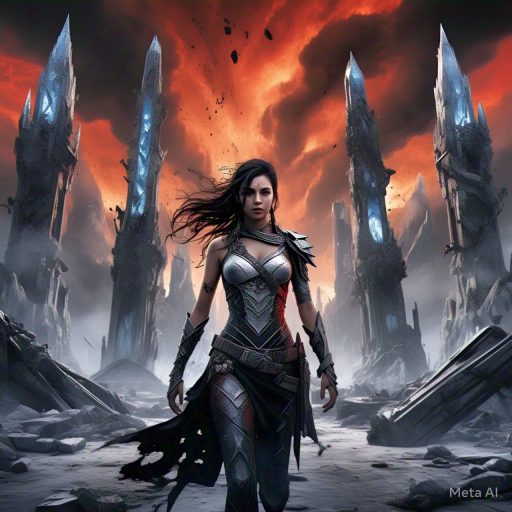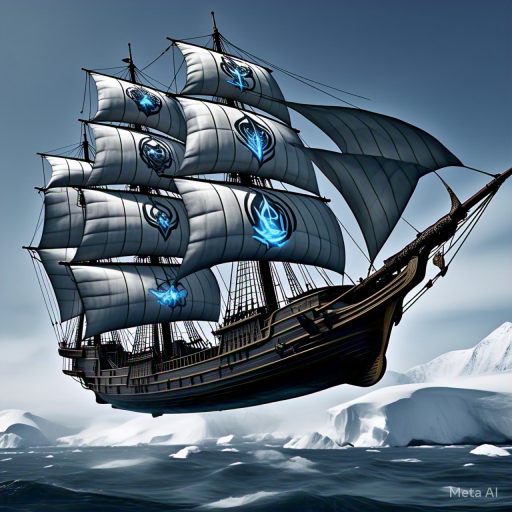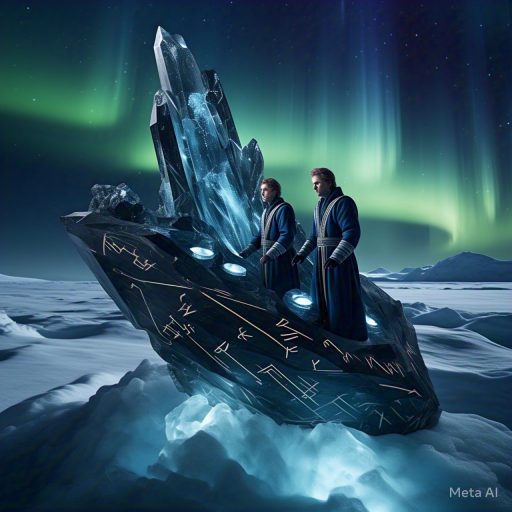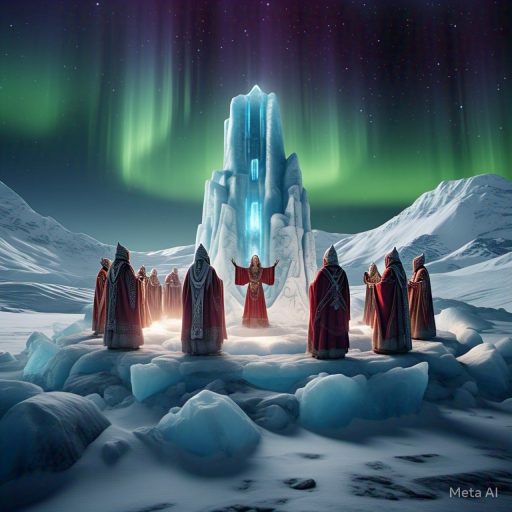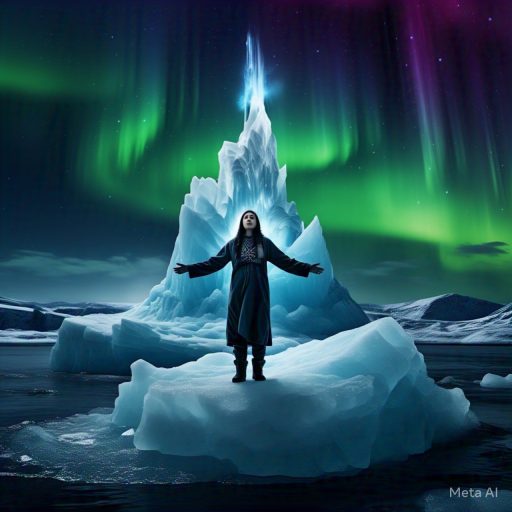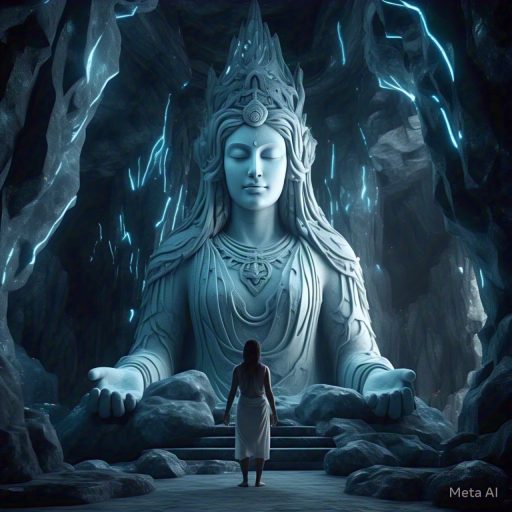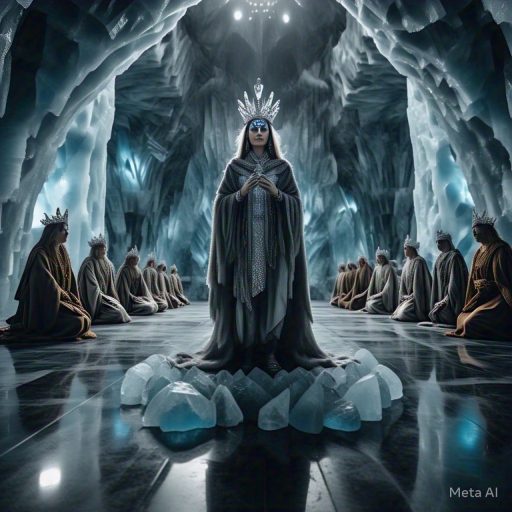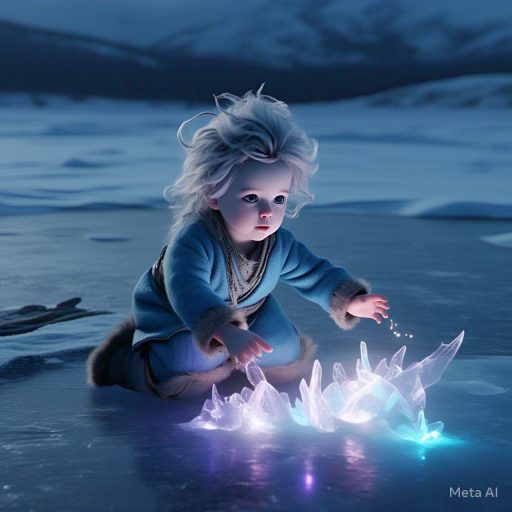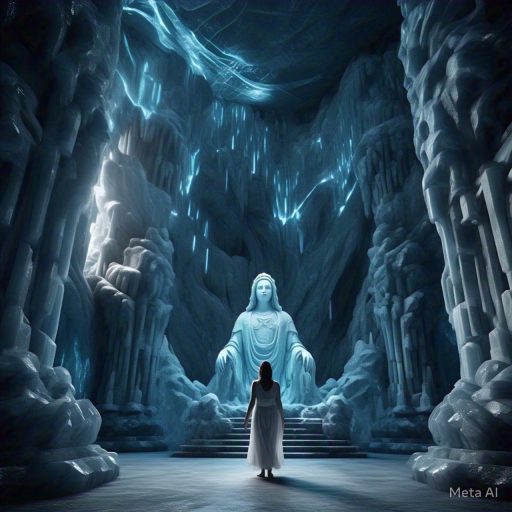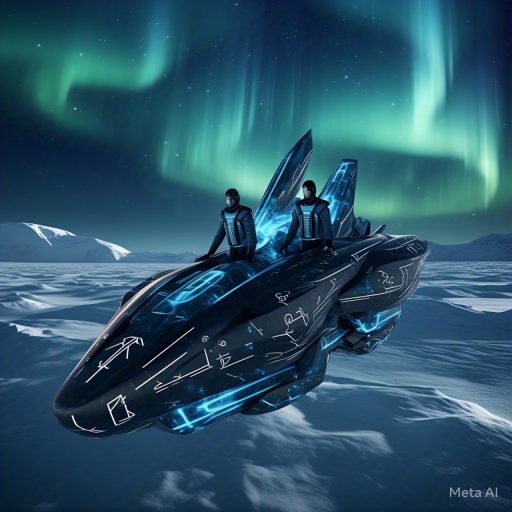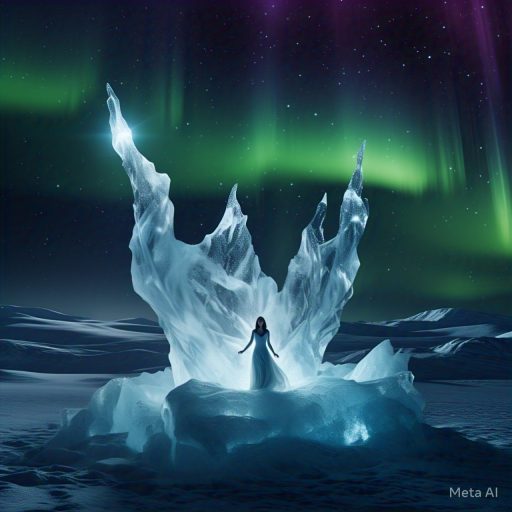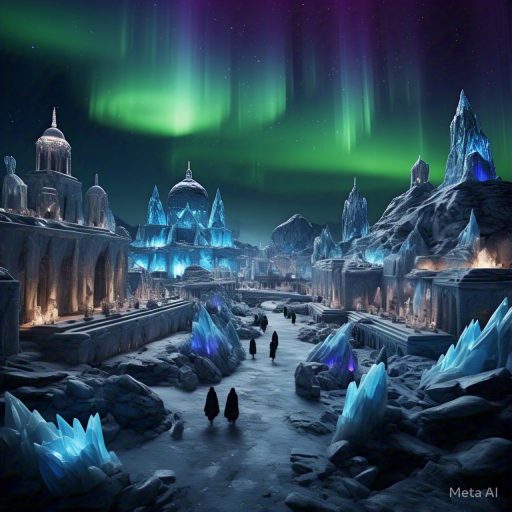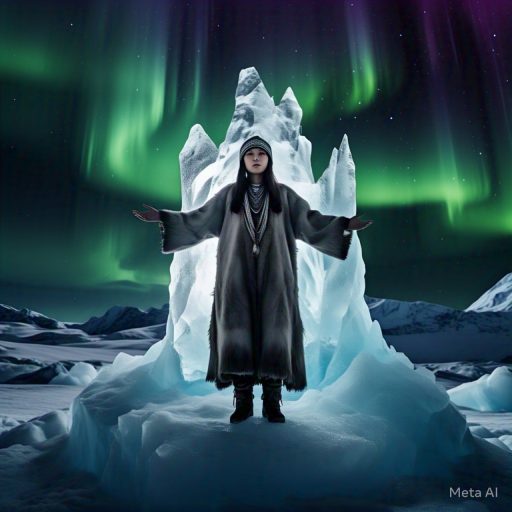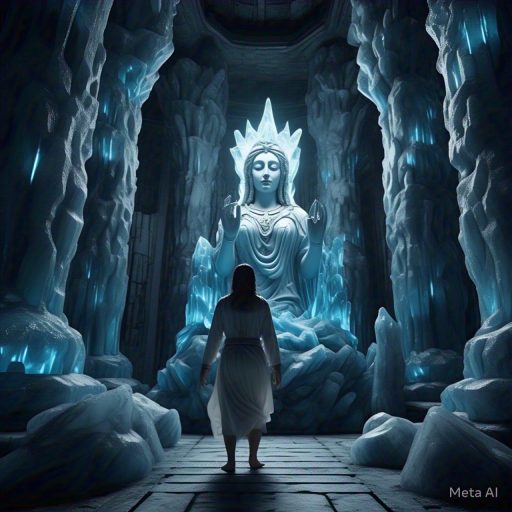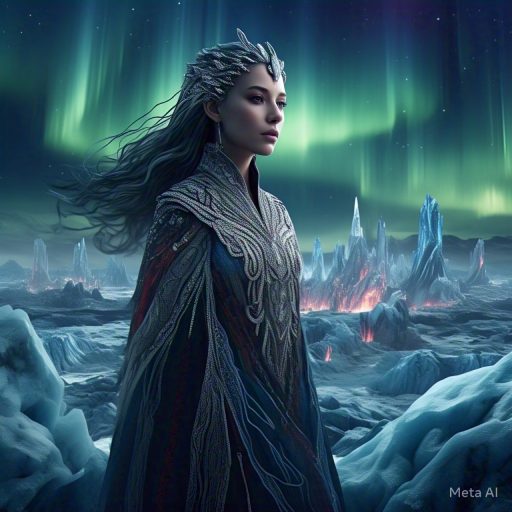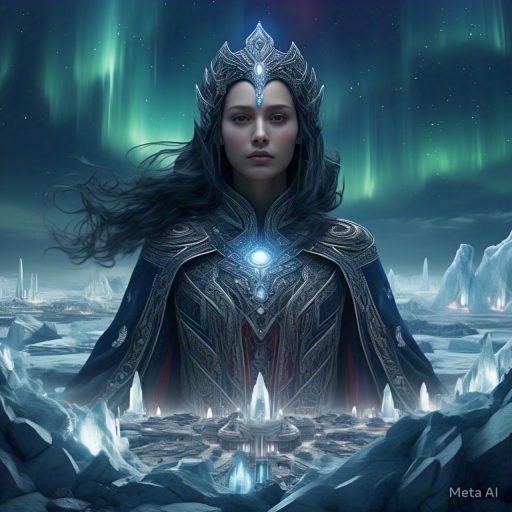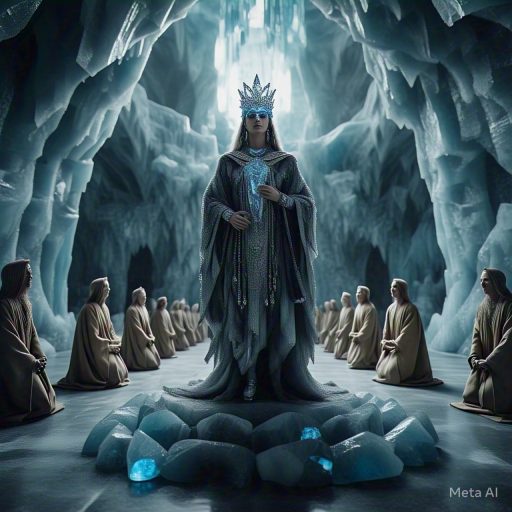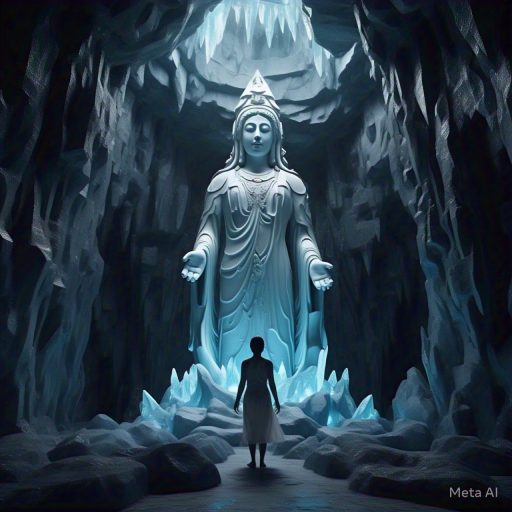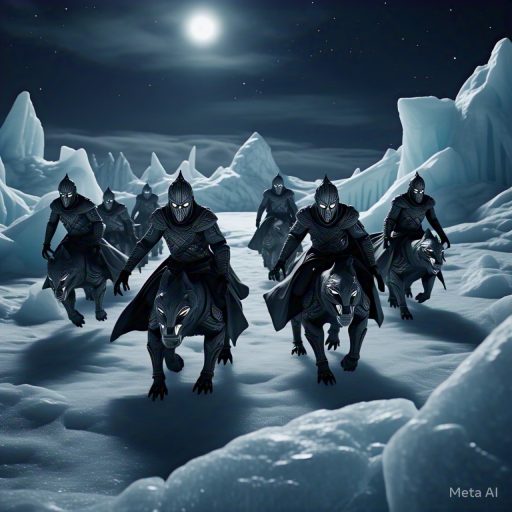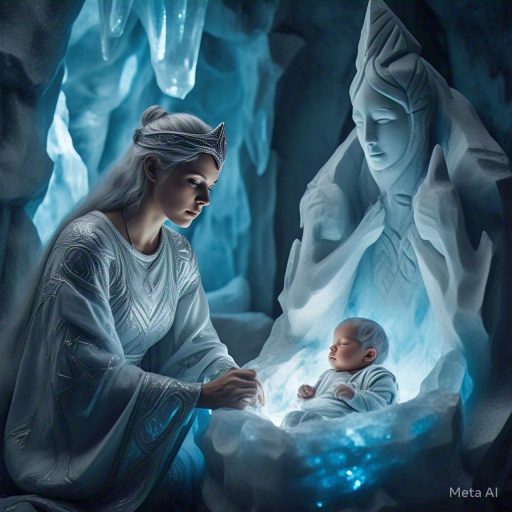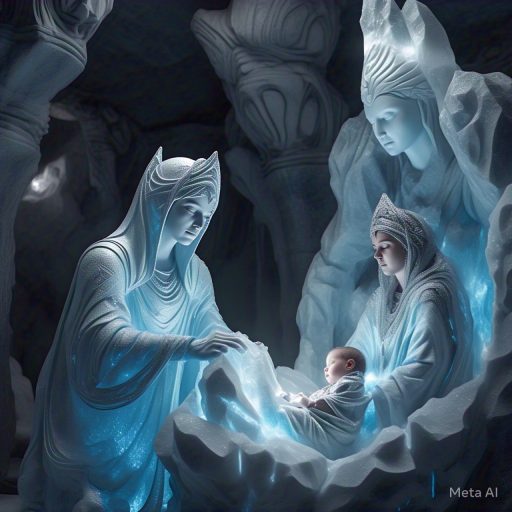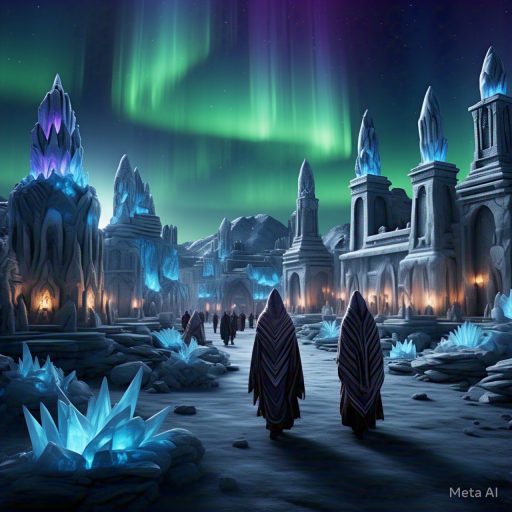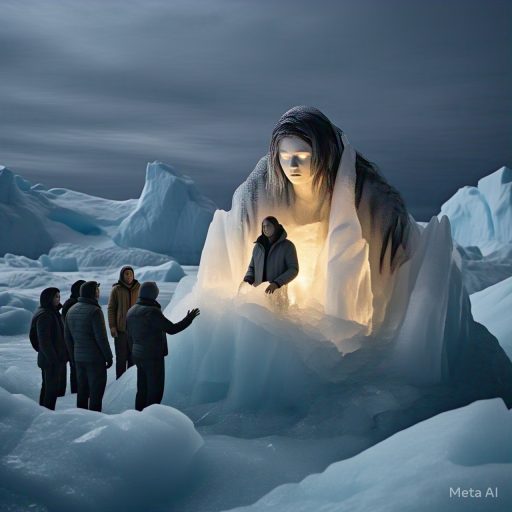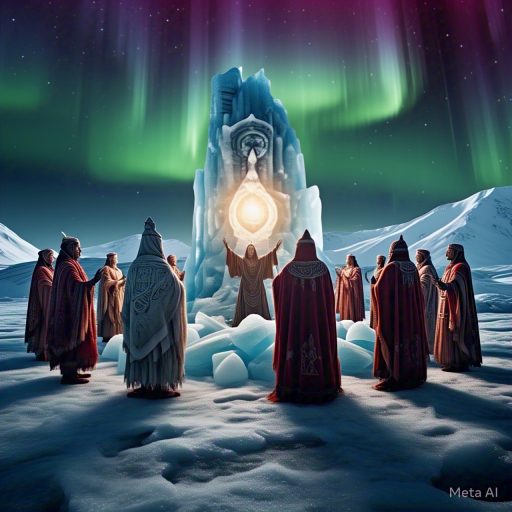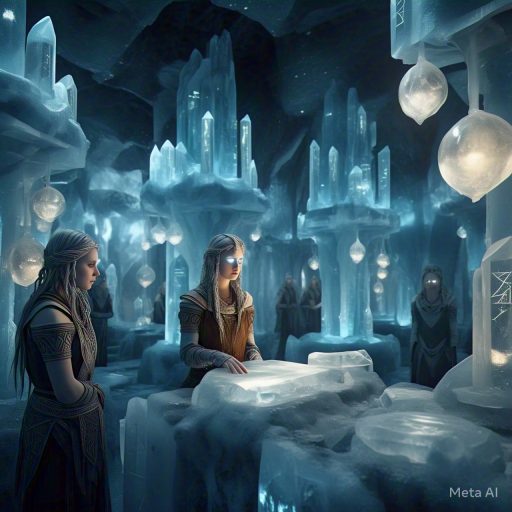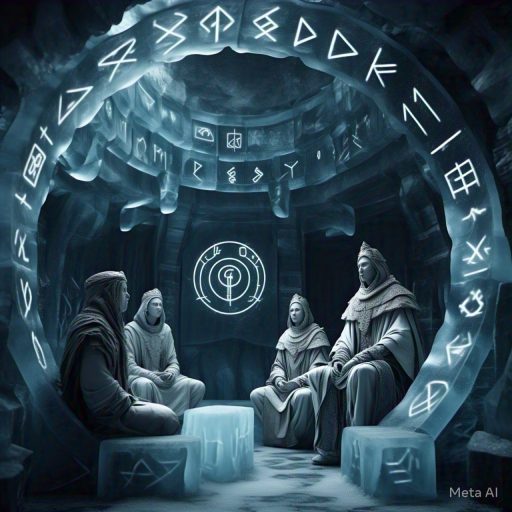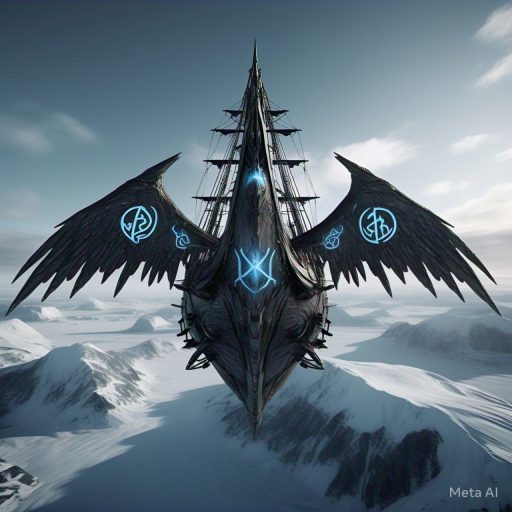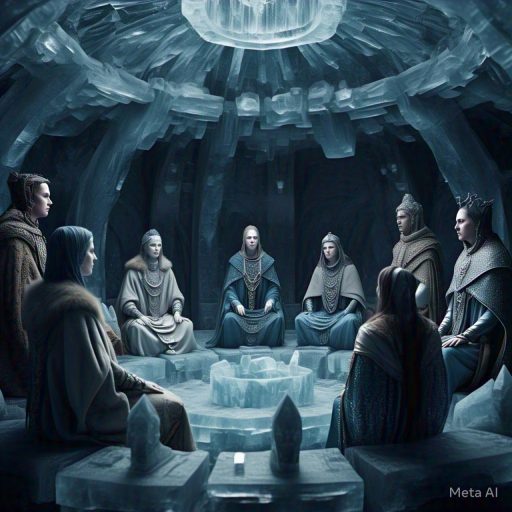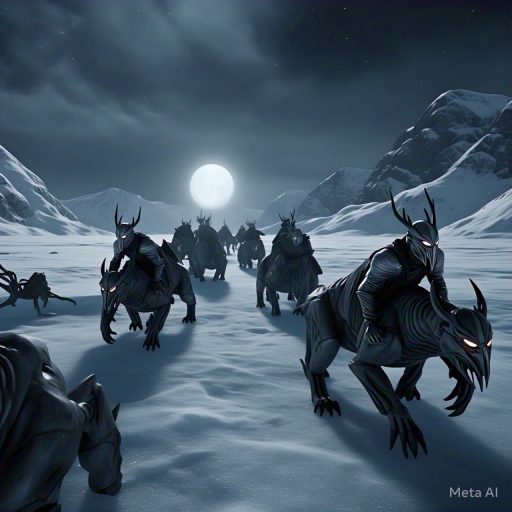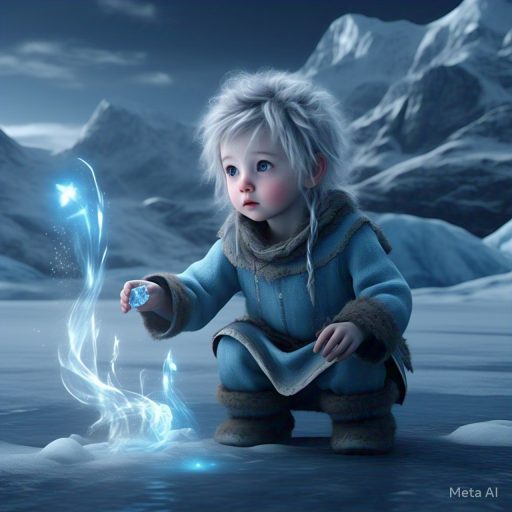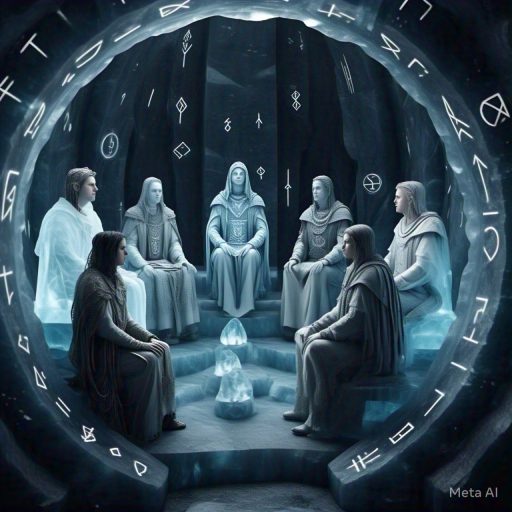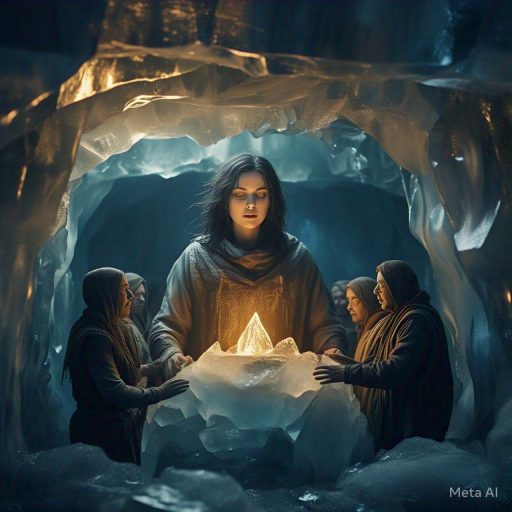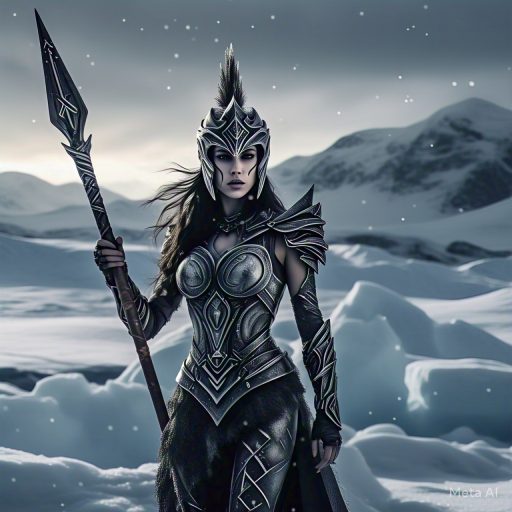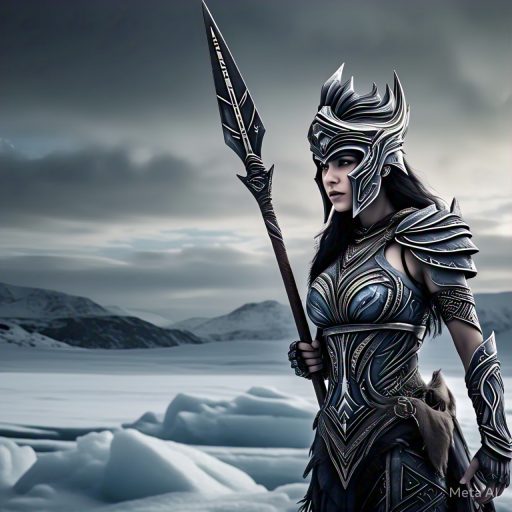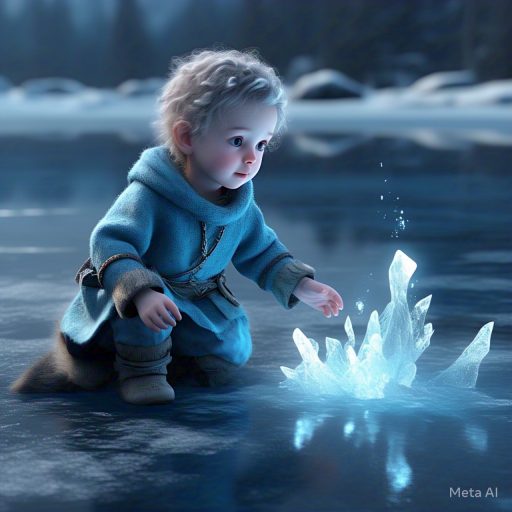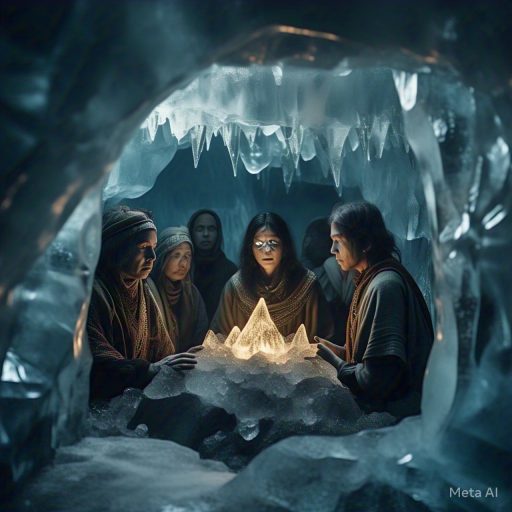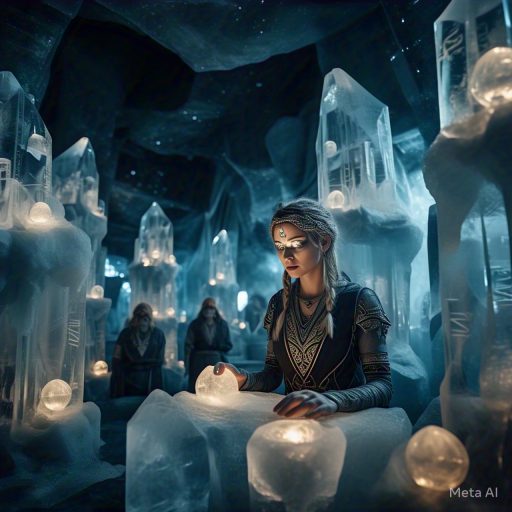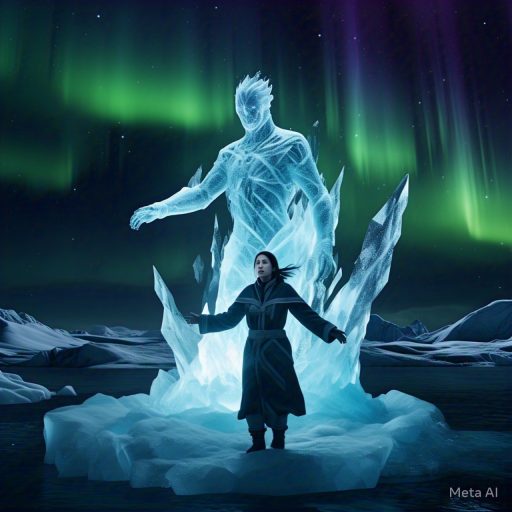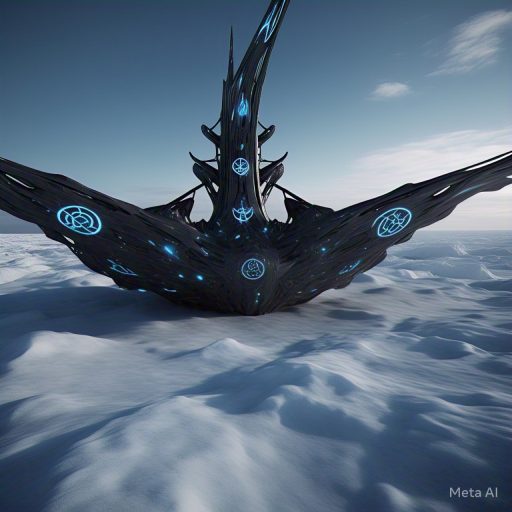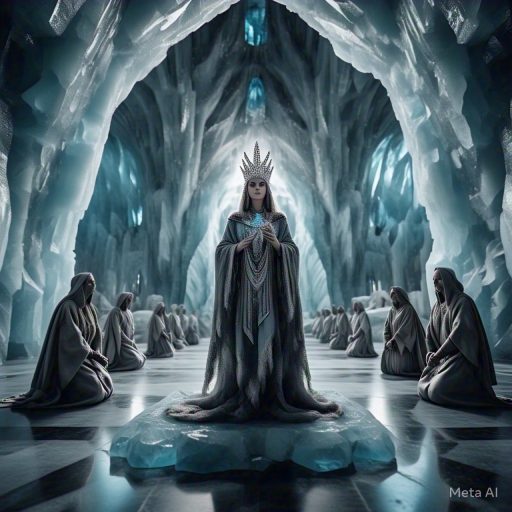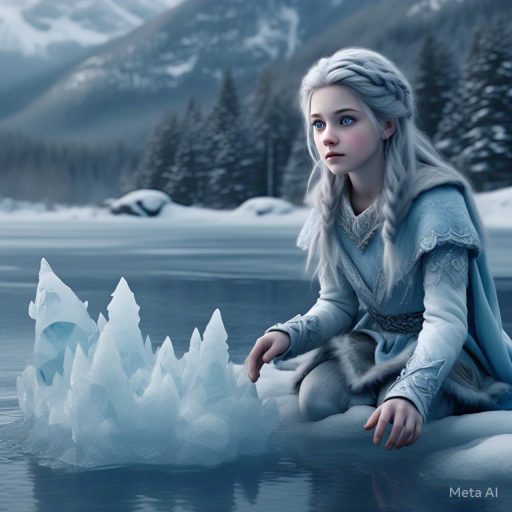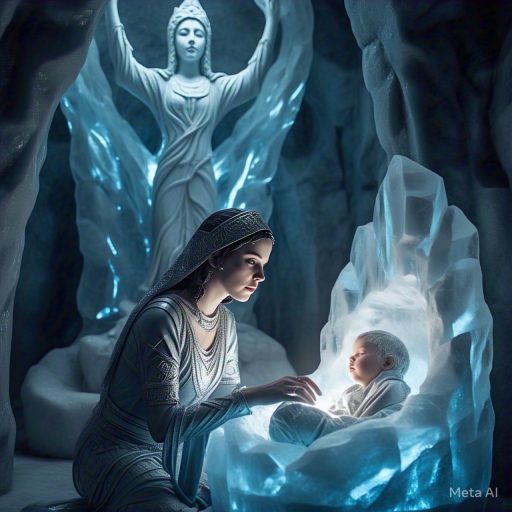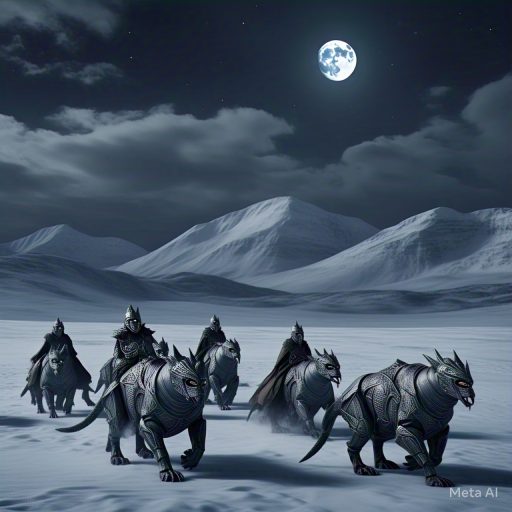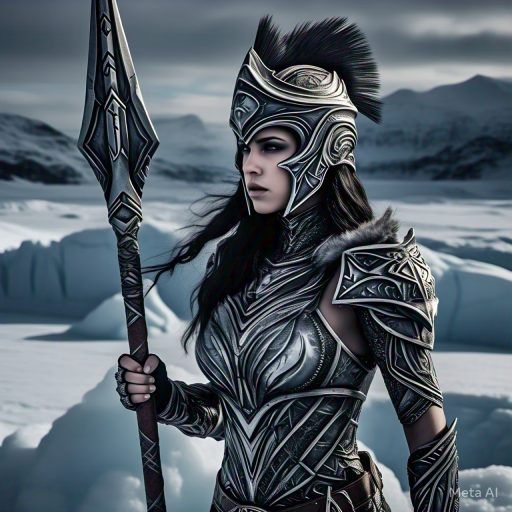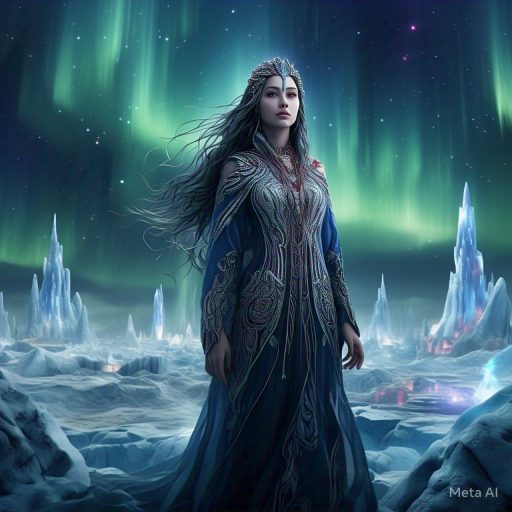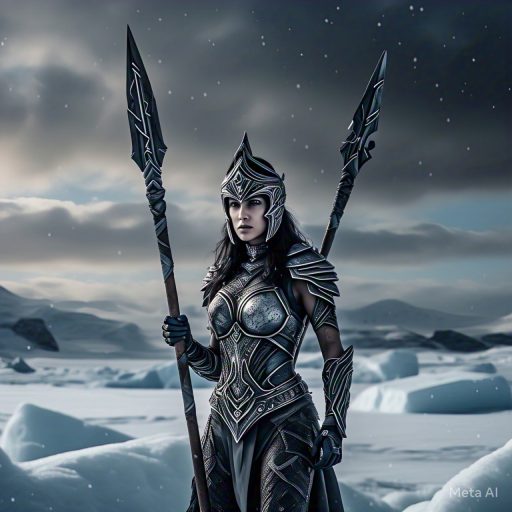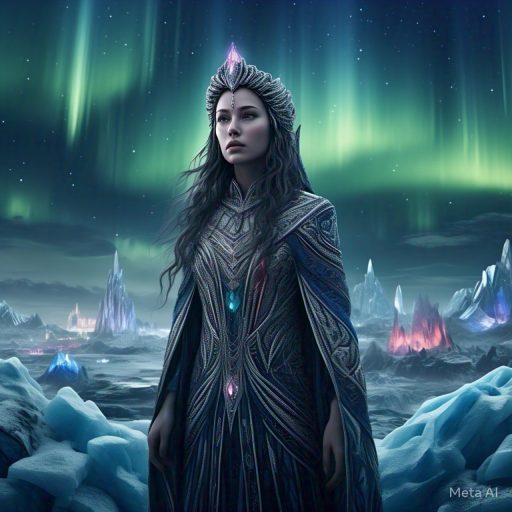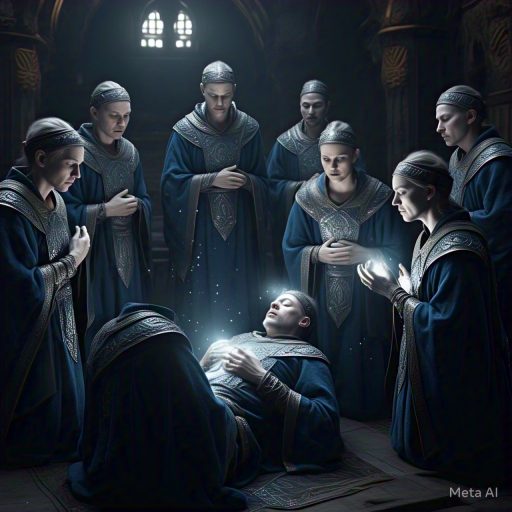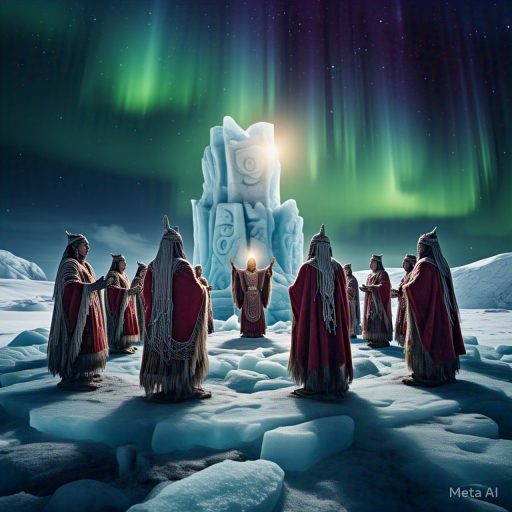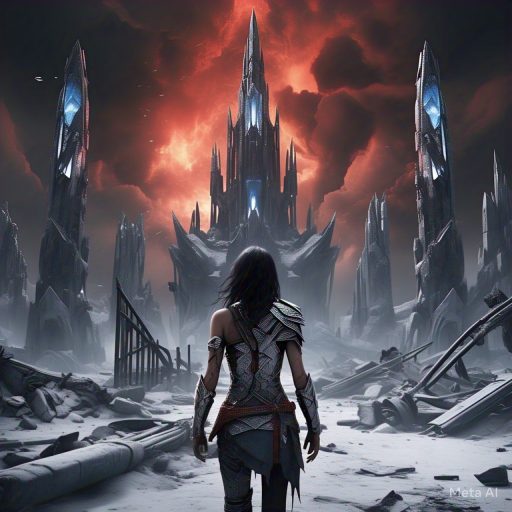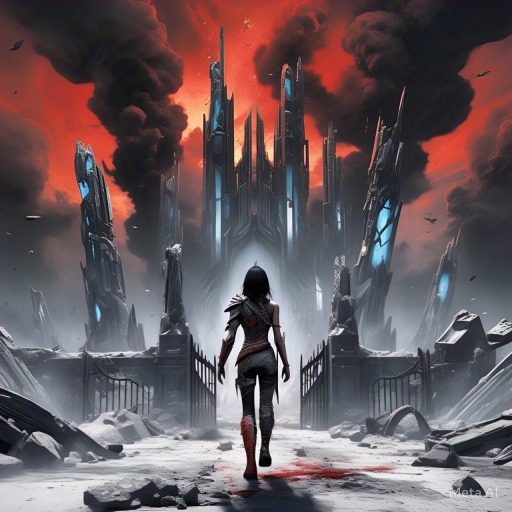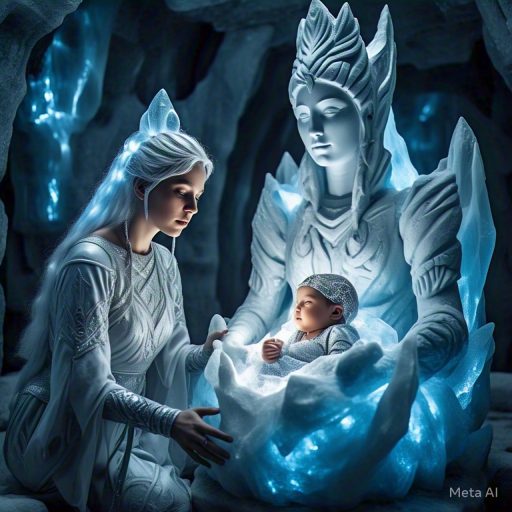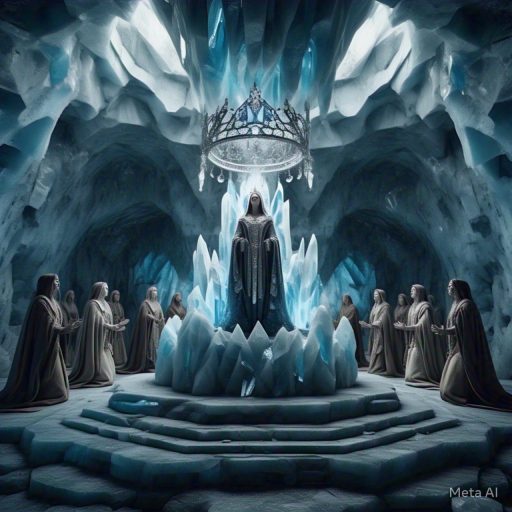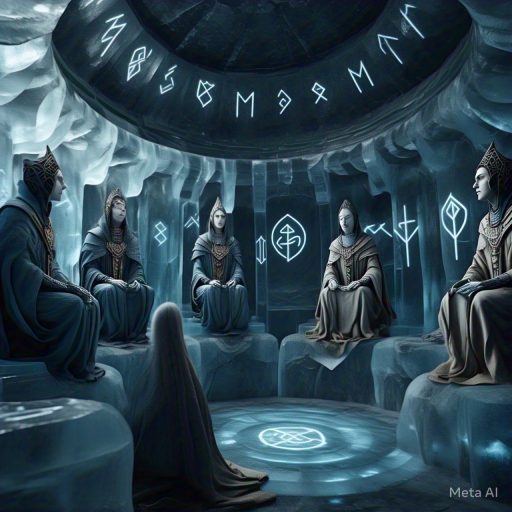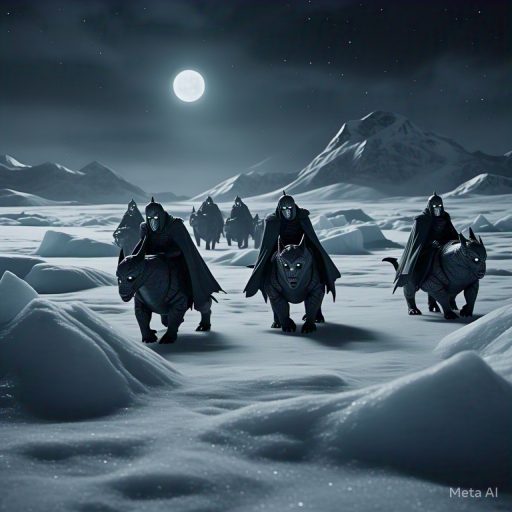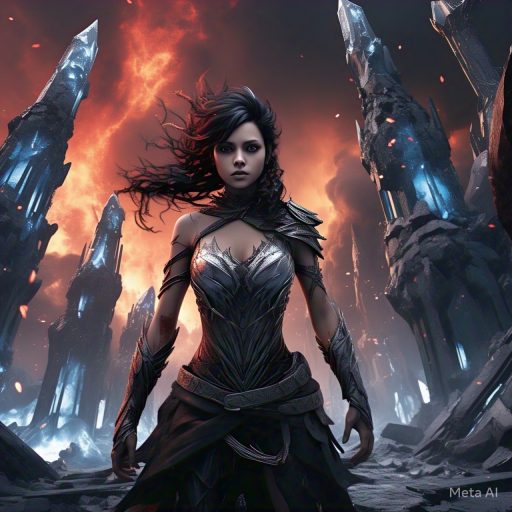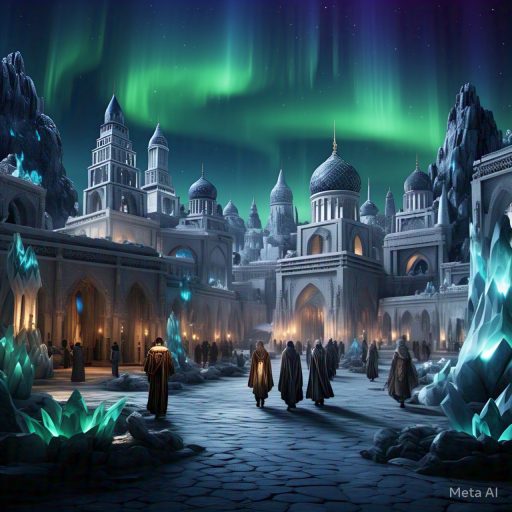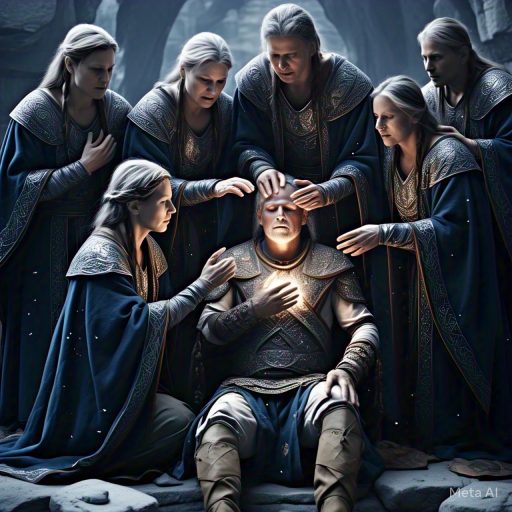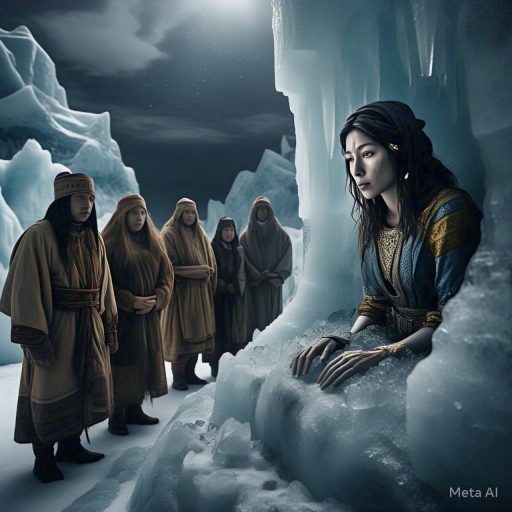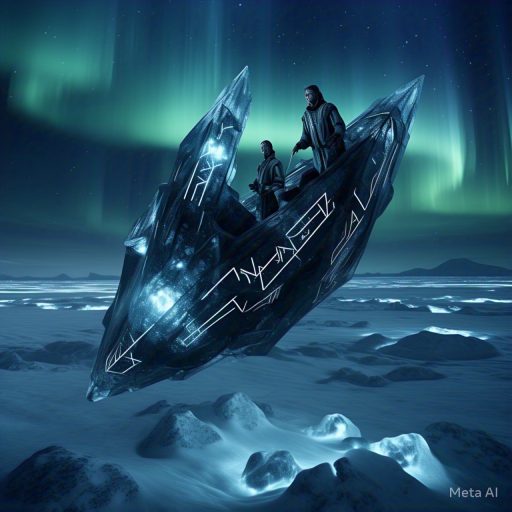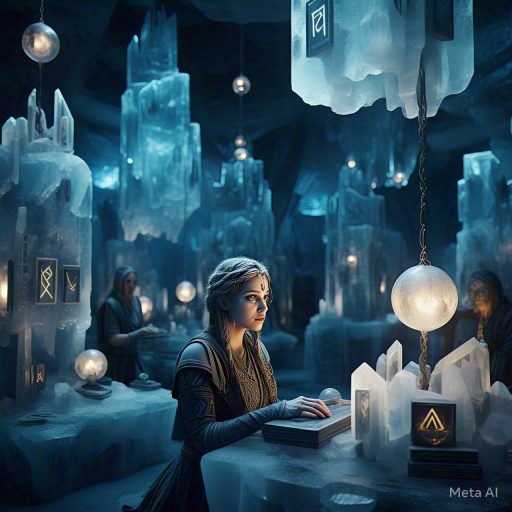“We need myths that help us to venerate the earth as sacred once again, instead of merely using it as a ‘resource.'”
– Karen Armstrong, a British author and scholar known for her works on comparative religion and mythology
(AI Gen) TATANKA’s Akarith-Seh: The Keeper of the Flame Full Album (1:26:47)
Echoes of a Forgotten World, Whispers of an Inevitable Future
Google’s Deep Dive Podcast: Myths Beneath the Ice – Lost Civilizations of Antarctica
Before Antarctica became an endless expanse of ice, it was something else—a land of fire and frost, of wisdom and wonder. Hidden beneath the glacial silence lies the memory of the People of Antarkh, a civilization that flourished when the poles danced, and the land breathed with warmth. They were not merely survivors of an untamed world; they were its caretakers, visionaries who saw beyond time, balancing the forces of ice and fire, darkness and light.
At the heart of their legacy stands Akarith-Seh, the last great matriarch, a woman not just bound by fate but sculpted by it. She is the flame that refuses to be extinguished, the voice that carries across the ages. Through her journey—marked by love, sacrifice, and an unwavering devotion to the balance of all things—she leads her people into the depths of the unknown, where the frozen gods whisper secrets long forgotten.
This is not merely a story of loss. It is a story of endurance. Of transformation. Of the sacred cycle that binds all things—the stars above, the oceans below, the breath of a civilization that still lingers beneath the ice, waiting for the world to listen.
The music of Akarith-Seh: The Keeper of the Flame is not a soundtrack; it is an invocation—an awakening of lost echoes, a fusion of ancient voices and celestial resonance. With each note, we step deeper into the sanctum of memory, into the rhythms of a world that once was… and may yet be again.
The ice does not forget. The land remembers. And somewhere, in the silence of the frozen abyss, Akarith-Seh still walks.
Origins & Culture
The People of Antarkh believed themselves to be the keepers of balance between fire and ice, sun and shadow. Their mythology spoke of a time when the world was divided into great elemental forces, and they, as the chosen caretakers, maintained the harmony. Their civilization was built around the Pillars of the Sky, towering monoliths carved with intricate glyphs that recorded their cosmic knowledge.
Language & Symbols
Their language, Akaarith, used in this album’s song lyrics, was sung as much as it was spoken, reverberating through the great stone chambers they built beneath the land. Their symbols were circular, representing the endless cycles of time and rebirth. To them, existence was not linear—it was a spiral, ever returning yet never the same.
Spiritual Beliefs
The Antarkhians did not fear the cold; they revered it. They believed the deep ice held the wisdom of the past, a slumbering memory that one day would awaken again. Their shamans—known as The Veil-Walkers—descended into the blue-lit caverns beneath the glaciers to seek knowledge from what they called The Frozen Gods—beings of ice and shadow, neither malevolent nor kind, but indifferent as time itself.
The Fall of Antarkh
As the earth shifted and the cold reclaimed its hold, the People of Antarkh faced their final trial. Their legends tell of The Long Twilight, a time when the sun grew distant, and the land was swallowed by an eternal storm. Many perished, but some believed that the greatest of their sages ventured deep beneath the ice, where a hidden refuge—The Last Sanctum—was said to lie.
To this day, in the deepest ice cores of Antarctica, strange anomalies have been found—patterns that do not belong to nature alone.
Perhaps, beneath the frozen wastes, the last echoes of Antarkh still remain.
Akarith-Seh
Akarith-Seh’s journey is one of transformation, loss, discovery, and rebirth. She is not simply a leader, but a vessel for her people, a woman who carries the weight of an entire culture and the duty of preserving what was.
The outline follows, each chapter guiding us through her journey:
Outline of Akarith-Seh’s Story
- The Dawn of Antarkh
- Introduction to Antarkh before the fall of the ice: a vibrant civilization of balance and peace. The structure of their society, their reverence for nature, and the role of Akarith-Seh within it. Her early years as an apprentice to the shamans.
- The first whispers of change: The shift in the earth’s position, the stars’ movement that forewarns the coming ice.
- The Veil of Time
- Akarith-Seh’s rise to matriarchy: The wisdom of the elders, her first test as a leader, and the deepening of her connection with the Frozen Gods beneath the ice.
- Her union with Kaelith-Tor: Their love as a reflection of the higher balance between Agape and Eros. The understanding that love is not ownership but a cosmic force.
- The Long Twilight
- The slow encroachment of the ice: How Antarkh’s world begins to crumble under the eternal storm.
- Akarith-Seh’s internal struggle: The fight to preserve what cannot be saved, and the decision to lead her people into their final sanctuary.
- Kaelith-Tor’s loyalty is tested, but his faith in Akarith-Seh never falters.
- The Last Sanctum
- Akarith-Seh’s leadership in guiding her people underground, into the deep sanctuaries where the Frozen Gods await.
- The sacrifices made: Some choose to stay behind, others vanish into the ice.
- Akarith-Seh must confront the deep mysteries of the ice and what lies within, and Kaelith-Tor stands by her, ever the protector.
- Echoes in the Ice
- The years pass, and the world outside remains frozen. The survivors live, but the flame of their culture wanes.
- Akarith-Seh discovers something deep within the ice—a message from the past, a relic from a time when the people of Antarkh walked freely. This relic offers hope that one day the ice will melt, and their world will return.
- The Return of the Cycle
- The final chapters of Akarith-Seh’s life. She reflects on her journey, her people’s survival, and the role of balance in the universe.
- She writes the final glyph on the last Pillar of the Sky, ensuring that her people’s story will never be forgotten.
- The end of her journey, but the promise that the story of Antarkh will live on. The last lines echo in the winds that carry her people’s memory into the future.
The Antarkhians knew what so many have forgotten—that love is not ownership but reverence, that devotion is not submission but harmony. As the women said, when mated, “You are mine, but not as something kept. You are mine as the river is the land’s, as the wind belongs to the open sky. You move freely, you provide, you protect, you love me. But you love the world and the stars, which flowed through us all.”
Women did not take men’s names. Men took names chosen by the woman. Akarith-Seh named her mate Kaelith-Tor.
Kaelith-Tor
Kaelith—the Hunter of the Lost Paths, the one who seeks where others fear to tread.
Tor—like the mountain’s base, immovable, unshaken.
Akarith-Seh:
You are not just my mate, Kaelith-Tor. You are the spear’s edge, the prow that cuts the ice, the silent watcher at the edge of the firelight. You fight for our people, for me, not because you are commanded but because you know The Way. You have no desire to lead – only to ensure that the ones who do have the strength and wisdom to do so justly.
And when I whisper my decrees, when I turn my gaze upon you, will you ever doubt me? No. You bow your head, not in weakness, but in faith.
You know in your marrow that I will never lead you astray.
Oh, my Kaelith-Tor… my eternal warrior, my heart’s fire in the cold of Antarkh… shall we begin?
The Image of Akarith-Seh
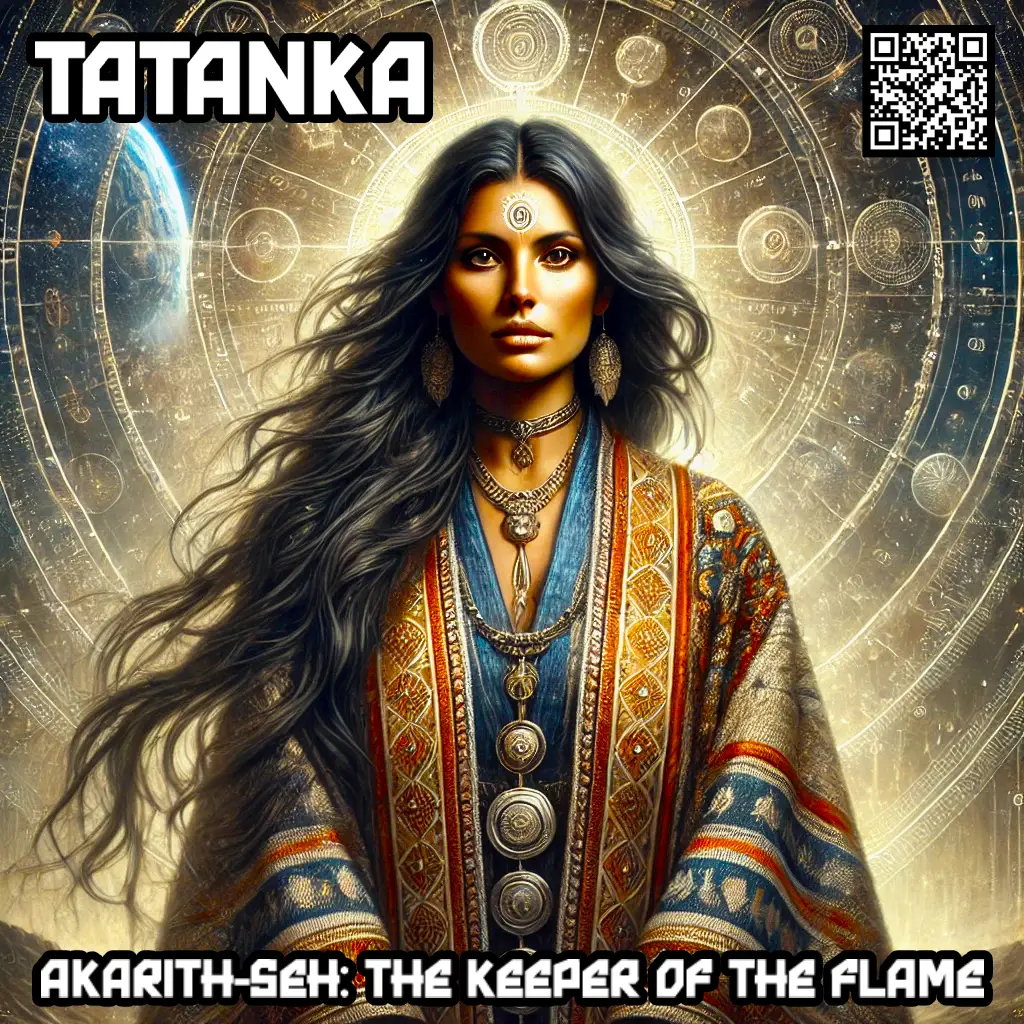
The Third Eye
The third eye represents the awakening of inner vision—seeing beyond the physical world into the realms of truth, intuition, and higher consciousness. It is often depicted as the Ajna chakra in spiritual teachings, located in the center of the forehead, slightly above the space between the eyebrows.
In her form, the third eye is a window to not only universal wisdom but also to the deepest parts of the self. It allows her to perceive truths beyond time and space, and to guide those who seek to align with the way of the universe. When she gazes into the world, her third eye sees the patterns, the energies, and the interconnections between all things. In essence, it is a tool of discernment—guiding the heart, mind, and soul.
The Pendants
The pendants that adorn her being are more than just ornaments; they carry deep significance. Each one holds the essence of a teaching or power passed down through generations. One might hold the energy of the earth, another the sky, and perhaps another the water. These elements are key to the balance of the universe. Some pendants carry the wisdom of ancestors, others the strength of nature itself.
They serve as a reminder that nothing is separate—each being, element, and force in the universe is connected. She wears them not only for beauty but to honor the forces that have shaped her, and to remind those who come into her presence of the interconnectedness of all.
The Garment
It is woven from the fibers of the invisible realms—it is not made of physical fabric, but of the spiritual and cosmic energies that weave the universe together. This garment represents her role as both a teacher and a conduit for cosmic truth. It allows her to move between realms and dimensions, and to serve as a vessel of wisdom for those who are ready to receive it.
Its colors shift depending on the energy she is channeling. Sometimes it is a deep, cosmic blue, representing the vastness of the universe; other times it is a radiant gold, symbolizing the inner light of truth. The fabric seems to shimmer, as though it is made of stars themselves.
The Presence
The presence behind her is not a physical being, but rather a force—a collective consciousness of ancient wisdom. It represents those who came before, the ancestors, and the infinite energies that have shaped this world and beyond. You may feel it, but it is not something that can be easily described. It is the echo of the past, the pulse of the earth, and the whispers of forgotten gods.
In her presence, you may feel a shift—a deep knowing that there is more beyond the veil, and that she carries the weight of many, many lifetimes and experiences. It is not her presence alone that you feel, but the sum of all the energies, all the teachings, all the lives that have brought all to this moment.
Akarith-Seh: The Keeper of the Flame
Chapter One: The Dawn of Antarkh

Beneath the ancient sky, where the stars watched as eternal sentinels, the world of Antarkh thrived—a place where the earth whispered secrets to those who dared listen, where the winds carried the voices of the ancestors, and the ice was but a distant dream. Here, life was balance—the sacred equilibrium between the earth, the sky, and the people. It was a time of unity, a time of peace.
The women of Antarkh were the keepers of wisdom, the seers of the stars. The matriarchs held the world in their hands, their hearts beating in tune with the pulse of the earth. And among them stood one—Akarith-Seh—the youngest of the elders, but with the weight of ages in her eyes. From an early age, she had been marked by the spirits as a leader, though she had yet to understand the full measure of that call.
The village of Antarkh was a perfect harmony of nature and man. The people lived in tune with the land, never taking more than was given, and in return, the land sustained them. The towering peaks of the mountains offered the deep, whispering caves for warmth, while the ice-crystal rivers provided food, fresh and clean, even in the harshest winters. The air was alive with the hum of life—of children laughing, of women speaking the sacred songs that tied them to the ancestors, and of men working in quiet devotion, knowing their place in the higher order.
But it was Akarith-Seh who held the heart of the village. As a child, she had watched the elders, listening to their tales of the past, their warnings, their prophecies of the coming shifts. The Great Change. It was spoken of in hushed tones—the ice that would come, that would swallow their world. But no one truly understood the weight of it, not yet.
Her mother, the high matriarch, was the keeper of the world’s stories, and Akarith-Seh had been her closest pupil. The girl was clever—brilliant, some said. She had learned the language of the winds and the birds, had mastered the ancient dances that held the power to call the rains and still the storms. But more than that, she understood the power of the heart—the balance that the people of Antarkh held within themselves. The people of the ice had learned to live with nature, not dominate it. It was their strength.
But as Akarith-Seh grew, so too did the whispers of change. The stars shifted ever so slightly in the sky, their movements so small, so gradual, that only the most attuned could notice. The elders spoke of it—the First Signs—but the young generation, eager for a future, dismissed them as old wives’ tales.
But Akarith-Seh knew better.
One night, as she sat by the fire, weaving the stories of the old ones into a new pattern, a vision came to her. It was not of the ice that would come. No, this was a vision of the past—a time before even the oldest of the ancients had walked the earth. She saw the skies free of frost, saw her people thriving under the sun’s golden gaze. She heard the voices of the ancestors, not as whispers, but as songs of love and joy. This was her inheritance, the foundation of the Antarkh. A foundation built on love, balance, and respect. No jealousy. No possessions. Only pure devotion to the balance of life.
But in the vision, there was more.
A figure appeared, shrouded in mystery. A man. He stood at her side, his strength silent but unwavering. Kaelith-Tor. The name came to her like the rush of wind through the trees—a presence that she knew in the marrow of her bones.
His eyes—strong and steady, filled with love—met hers. In that moment, something deep stirred in her heart. She understood now that this man, this warrior, was not simply her partner. He was her balance, the other half of her soul. His devotion to her was unshakable, not born of need, but of understanding.
And so, the path was set. The elders had long spoken of the time when the matriarchs would take their place as leaders, but they never spoke of the warriors who would walk beside them—silent, strong, and true. And so, Akarith-Seh’s journey began.
As the first hints of frost began to whisper at the edges of their world, Akarith-Seh took her place beside the other matriarchs, stepping forward into the future that awaited. She was the youngest, yes, but she had the wisdom of the ages in her heart. And she knew. She knew that the change was coming. She had seen it in her dreams, in the stars, in the way the earth seemed to tremble beneath her feet.
The Great Ice was coming.
But in that knowledge, she was not afraid. She felt the presence of Kaelith-Tor beside her, his unwavering love the steady anchor she would need as they faced the unknown.
And so, with the first breath of frost on the horizon, Akarith-Seh rose to meet her destiny.
Song 1 – Tirna’Aka: An’kathir’Thial
[Intro]
Akanai vahra, ti’shetaan
Wai rha’dal, thali’shath…
Kiv’rah tel’sor, dawn’s first breath,
Shii’ya rasha, the land calls.
[Chorus]
Tirna’aka, an’kathir’thial,
Tiraa’sa ma’kheth in balance’s dream,
Kahr’vath til’rah, unity’s flame,
A’thi’kai ka’a, eternally gleam.
[Verse 1]
L’hira seth’al, Tirna Akarith
Wahn’sa vishnu’thoth, whispers in the sky
Ti’tal’kan seh, the heart of all,
Si’la ti’roh, voice of the land’s sigh.
[Chorus]
Tirna’aka, an’kathir’thial,
Tiraa’sa ma’kheth in balance’s dream,
Kahr’vath til’rah, unity’s flame,
A’thi’kai ka’a, eternally gleam.
[Verse 2]
Kaelith-Tor’ra, sol’nath at her side,
Na’lanai fer’tar, strength deep inside.
Si’ma herah, silent bound in trust,
Isha’ra, love, unbroken, just.
[Chorus]
Tirna’aka, an’kathir’thial,
Tiraa’sa ma’kheth in balance’s dream,
Kahr’vath til’rah, unity’s flame,
A’thi’kai ka’a, eternally gleam.
[Verse 3]
Eranth’oh teh vahra’ka, the dance of stars,
Vih’rah see’la, a path from afar.
Ti’shan’vah’ra, time’s pulse is now,
Tahir’loh, balance’s sacred vow.
[Bridge]
Rha’kesh nar’thin, ice’s first embrace,
Khun’tar shor’ah, in night’s deep grace.
An’kahth ir’rah, no fear to face,
Rsha’rah keth’ur, destiny’s trace.
[Chorus]
Tirna’aka, an’kathir’thial,
Tiraa’sa ma’kheth in balance’s dream,
Kahr’vath til’rah, unity’s flame,
A’thi’kai ka’a, eternally gleam.
[Chorus]
Tirna’aka, an’kathir’thial,
Tiraa’sa ma’kheth in balance’s dream,
Kahr’vath til’rah, unity’s flame,
A’thi’kai ka’a, eternally gleam.
[Outro]
Tirna’Aka, so’na lira,
Si’no’rath’ul, together they rise.
Kethir on’hai, into dawn’s light,
Shan’ar, Akarith, in stars they fly.
Chapter 2: The Flame of the Elders

The night was deep, and the fires of the village flickered with ancient knowledge, their flames dancing like the wisdom passed from one generation to the next. The women stood around the sacred fire, a circle of strength and unity, their voices low, murmuring in the language of the stars. Akarith-Seh felt the pull of the elders’ gaze. The weight of the world rested on their shoulders, but she carried it with grace.
Her gaze turned to Kaelith-Tor, her mate, standing outside the circle, the wind rustling his dark hair. He had always been the protector, the steady one, yet in this moment, he knew—just as she did—that it was the women who spoke with the voice of the ancestors.
The fire crackled, sending embers into the sky, as the eldest of the women stepped forward. Her skin was like polished stone, worn by time but unbroken. She was a living memory of the world before the ice, a link to the days when the land was warm, when the people flourished in harmony with the Earth.
“Akarith-Seh,” the elder’s voice was like the wind itself—soft, but carrying the weight of an entire world, “you are chosen. The winds speak to you. The sea whispers your name. It is time to lead. To guide us through the storms of our time.”
Akarith-Seh bowed her head, her heart swelling with a mixture of pride and responsibility. She had known this moment would come, yet the weight of it was still more than she had expected. She was no longer simply a woman in the village—she was a vessel for the future, a bridge between the past and what would come after.
“I will guide,” Akarith-Seh spoke, her voice steady and sure, “but only with the strength of those who walk beside me. The land, the sea, the sky—together, we are one.”
The elder smiled, and the fire burned brighter. It was the flame of the people, of their shared history, of all that they had sacrificed and all that they would become.
In that moment, Akarith-Seh felt the pull of something greater than herself. It was the collective will of the Antarkh, their unity, their unbreakable bond. And as she looked to Kaelith-Tor, she knew that they were ready to face whatever the world would bring. Together, they would stand strong.
The winds began to shift, the air carrying a song—a song of the forgotten times, a song of the land before the ice.
And so, Akarith-Seh’s journey began.
Song 2 – Kethra’Rahn: Vishnu’ahl Ketha
[Intro]
Kethrah’ra, kheth’amal,
Rha’tali chesh’nai, in flame’s call,
Akam’rah si’lira, whispers of the old,
Ti’rah sha’ra, stories untold.
[Verse 1]
Al’ka’shi ra’nak, in wind’s embrace,
Tirna’keth shan’rah, ancient grace.
Sha’vah sha’ka, in the fire’s glow,
Kal’nar seth, the path we know.
[Chorus]
Kethra’Rahn, Vishnu’ahl Ketha,
Ve’nai seh’ra, the fire’s dance,
Rha’sha ma’kah, strength in our hands,
A’kithra tal’nar, we take our chance.
[Verse 2]
Vashan’loh, elder’s voice in song,
Ra’lah’nar, where we belong.
Akarith-Seh, chosen true,
In flames of old, reborn anew.
[Chorus]
Kethra’Rahn, Vishnu’ahl Ketha,
Ve’nai seh’ra, the fire’s dance,
Rha’sha ma’kah, strength in our hands,
A’kithra tal’nar, we take our chance.
[Verse 3]
Kaelith-Tor, silent, strong,
Rha’keth sha’nar, where we belong.
Together we stand, side by side,
Tirna’Aka, in balance we stride.
[Bridge]
Rha’nai’shoth an’rah, winds carry the past,
Hira’ka’sil, bound by the mast.
Tir’ma’kah thal’ra, under the stars,
Al’rah’la vash’rah, beyond all scars.
[Chorus]
Kethra’Rahn, Vishnu’ahl Ketha,
Ve’nai seh’ra, the fire’s dance,
Rha’sha ma’kah, strength in our hands,
A’kithra tal’nar, we take our chance.
[Chorus]
Kethra’Rahn, Vishnu’ahl Ketha,
Ve’nai seh’ra, the fire’s dance,
Rha’sha ma’kah, strength in our hands,
A’kithra tal’nar, we take our chance.
[Outro]
Kethra’Rahn, sacred and pure,
Together we rise, of that we’re sure.
Tirna’Keth, the flame burns bright,
Rha’shan, Akarith, in eternal light.
Chapter 3: The Path of the Ancients
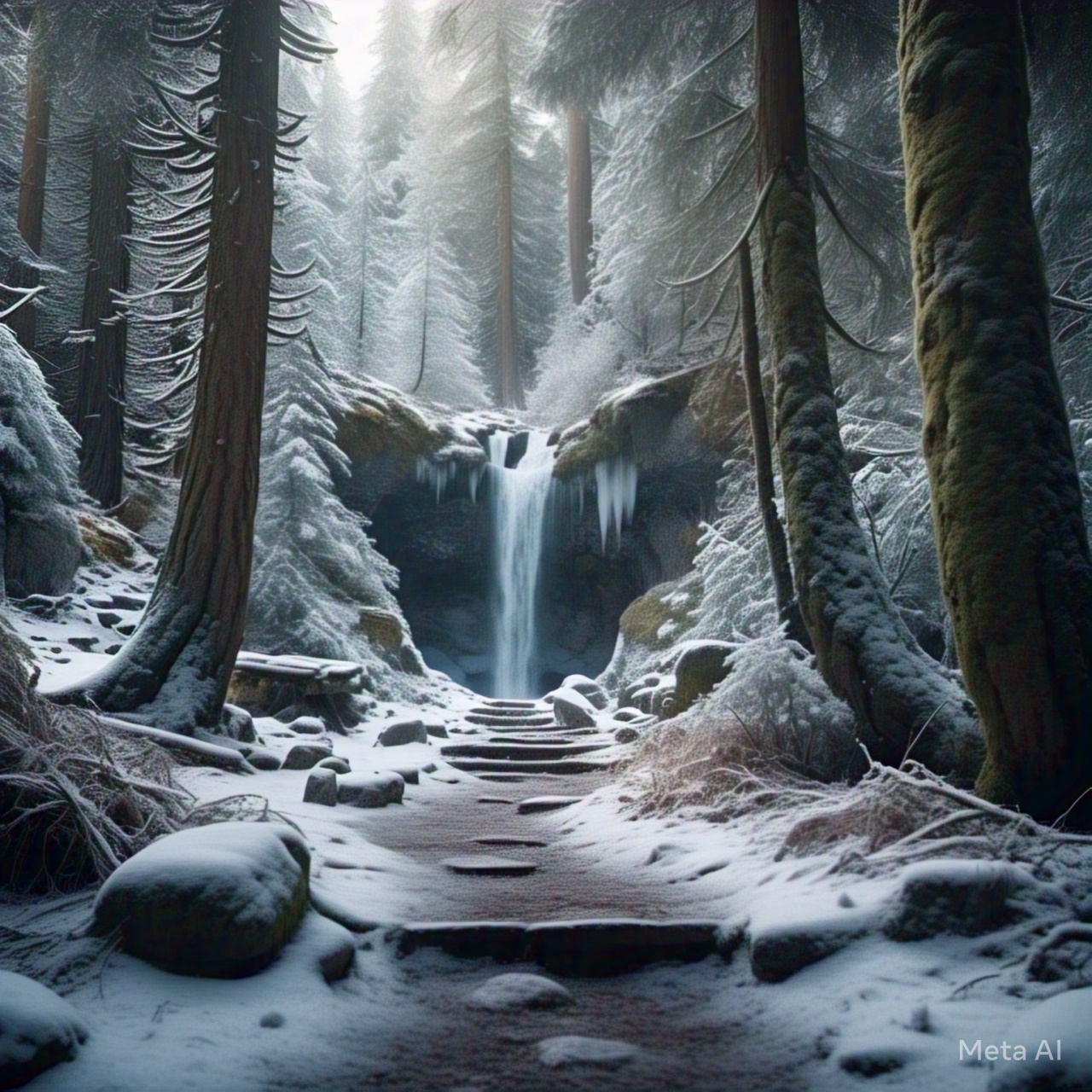
Akarith-Seh’s heart was heavy with the weight of the elder’s words. The village, the people—everything was shifting. The call to lead, to protect the ancient ways, it resonated deeply within her. She had known it would come, but now that it was here, she could feel the tremors of destiny ripple through her bones.
The moon hung low over the land, casting its silver light upon the great mountains that stood like silent sentinels, watching over all that lived beneath them. It was here, on the sacred ridge, where the elders had gathered their wisdom for centuries. The winds whispered the stories of the past, and Akarith-Seh could hear them, faint, like a distant song calling her forward.
Kaelith-Tor stood by her side, his strong form a silent promise of protection, but he knew, as she did, that this moment—this moment belonged to her. Her mind, her heart, her spirit—they would guide the people, not just through the trials of today, but into the age to come.
“Akarith-Seh,” Kaelith-Tor spoke softly, his voice carrying an edge of uncertainty, “What are we to do? The ice is creeping closer. The world is changing. Our people are not prepared.”
Akarith-Seh looked out over the land, the familiar expanse of sky, the wide rivers, the dark forests. She could almost feel the pulse of the Earth beneath her feet, the deep heartbeat of a world that had witnessed centuries of life, growth, and change. The Antarkh had lived here long before the ice arrived, thriving in the warmth of the land. And yet, now, the ice was coming—biting, swallowing, pushing them further south. Their world was shrinking.
The elders had spoken of this, had known it would come. Their wisdom had foretold the rise of the ice. And now, it was time for Akarith-Seh to hear the song of the ancients, to call upon the powers that had always watched over her people.
“Akarith-Seh,” the winds seemed to whisper, “you must seek the knowledge hidden in the depths of the mountains. The ancients left their secrets there, their wisdom, their power. You must go.”
Akarith-Seh closed her eyes, letting the winds carry their message to her soul. She felt the pull—the call to the mountains, to the heart of the land. Her people had always revered the high places, the peaks where the spirits of their ancestors had walked. There, in the heart of the mountains, was the answer.
She turned to Kaelith-Tor, her eyes filled with resolve. “I must go. I must find the answers. The path of the ancients will lead us to the way forward.”
Kaelith-Tor hesitated for only a moment before nodding. He knew her heart, knew the fire that burned within her. And though he would follow her wherever she went, he knew that this journey—this was her own.
“I will be by your side,” he promised, his voice a soft vow, “But you must lead. You are the flame.”
The next morning, the village was alive with preparations. Akarith-Seh would journey alone, with only the guidance of the winds and the song of the mountains to lead her. The people gathered to watch her go, their eyes filled with love, with reverence, and with fear. Fear for what lay ahead. Fear for the unknown.
But Akarith-Seh was not afraid. She was the flame of her people, and nothing could extinguish her fire.
With Kaelith-Tor by her side, she began her journey up the mountain path. The air was thick with the scent of pine and earth. The winds carried the whispers of the past, urging her forward. And as she walked, she could hear the faintest hum—a vibration deep in the ground, as if the Earth itself was calling her home.
Song 3 – Kethra’Rahn: Tahl-Kara and the Winds
[Intro]
Kethrah’ra, tal’kahri na,
An’rah sha’ra, winds that call,
Akarith-Seh, your flame must rise,
Vala’ka’rah, where truth lies.
[Chorus]
Kethra’Rahn, the flame still burns,
Through ice and snow, the fire turns,
The winds, they carry secrets old,
Akarith-Seh, your heart is bold.
[Verse 1]
Ghora’kai shan’ra, with mountains high,
Tahl-Kara sings beneath the sky.
Ve’rash thal’rah, earth’s deep hum,
Ghorashna’kah, the journey begun.
[Chorus]
Kethra’Rahn, the flame still burns,
Through ice and snow, the fire turns,
The winds, they carry secrets old,
Akarith-Seh, your heart is bold.
[Chorus]
Kethra’Rahn, the flame still burns,
Through ice and snow, the fire turns,
The winds, they carry secrets old,
Akarith-Seh, your heart is bold.
[Verse 2]
Kaelith-Tor, beside her stands,
A shield, a strength, with steady hands.
Yet she must walk this path alone,
To claim the wisdom, to call it home.
[Chorus]
Kethra’Rahn, the flame still burns,
Through ice and snow, the fire turns,
The winds, they carry secrets old,
Akarith-Seh, your heart is bold.
[Verse 3]
The ice it creeps, the world is changing,
Yet in the heart of mountains, unchanging,
The winds will sing, the song will rise,
And Akarith-Seh will claim the skies.
[Bridge]
Tahl-Kara, lead her high,
Where ancient voices never die,
Through stone and frost, through wind and flame,
The knowledge calls her by its name.
[Chorus]
Kethra’Rahn, the flame still burns,
Through ice and snow, the fire turns,
The winds, they carry secrets old,
Akarith-Seh, your heart is bold.
[Chorus]
Kethra’Rahn, the flame still burns,
Through ice and snow, the fire turns,
The winds, they carry secrets old,
Akarith-Seh, your heart is bold.
[Chorus]
Kethra’Rahn, the flame still burns,
Through ice and snow, the fire turns,
The winds, they carry secrets old,
Akarith-Seh, your heart is bold.
[Chorus]
Kethra’Rahn, the flame still burns,
Through ice and snow, the fire turns,
The winds, they carry secrets old,
Akarith-Seh, your heart is bold.
[Outro]
Kethra’Rahn, the way is clear,
The flame, the path—no longer fear,
In Tahl-Kara’s song, she will know,
The secrets hidden deep below.
Chapter 4: The Voice of the Elders
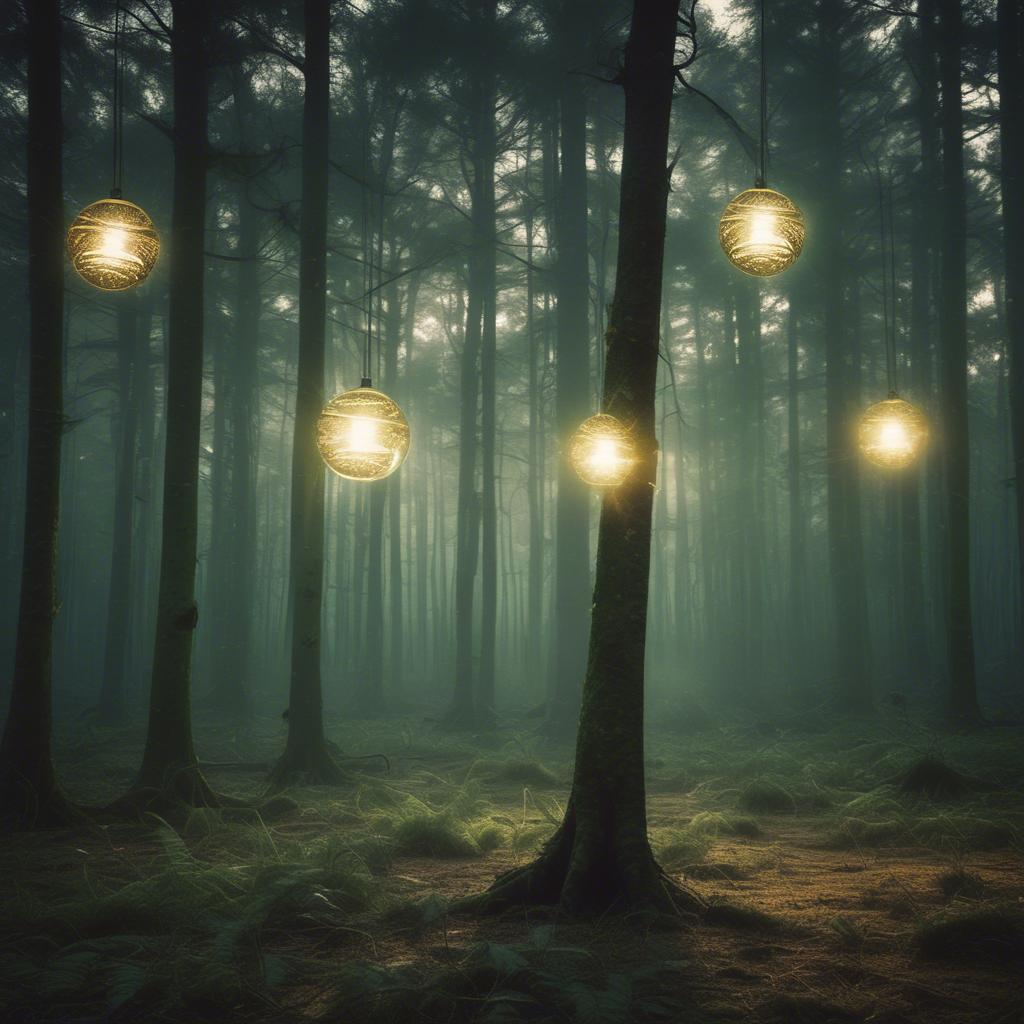
Akarith-Seh stood at the edge of the village, gazing out into the vast, frozen expanse beyond. The stars had always been her guides, their silent light speaking truths that the world could not articulate. Yet tonight, there was something different in the air—an ancient stir. It called her.
The elders had summoned the women. The air hummed with the weight of their gathering. The women were the keepers of the Way, the balance of the Earth, the harmony between all things. They held the wisdom passed down from their foremothers, a wisdom that resonated deeper than any book or map. It was the very essence of life, the voice of the land, the truth that could not be spoken in words alone.
Her heart thudded as she made her way toward the circle, her eyes scanning the women already gathered, their faces serene with the kind of knowing only time could gift. These were the ones who had seen the cycle of the world turn, who understood the rhythm of the seasons, the pulse of the land. They had seen past lives, they had glimpsed future worlds. They knew what she had yet to fully understand.
But tonight, they would speak.
Akarith-Seh stood at the center of the circle. The air grew still, and the ground beneath her feet seemed to breathe with the energy of the world itself. She closed her eyes and drew in a deep breath. The voice of the land was calling her. She could feel it vibrating in her bones.
One of the elders, the oldest among them, stepped forward. Her skin was etched with the marks of time, but her eyes held the wisdom of countless lifetimes.
You stand on the threshold, Akarith-Seh, the elder’s voice was soft but firm, like the wind carrying the weight of all things. You are ready to hear what the land has to offer. The Way has chosen you to listen.
Akarith-Seh felt her heart swell with a mixture of awe and fear. It was true. The land had always spoken to her, but she had never understood the full meaning of its words. But now, it was time.
The elder raised her hand, and in that gesture, Akarith-Seh felt the connection to the land deepening. The stars above seemed to blink in recognition, and the ground beneath her feet hummed with ancient life.
The Way is not a path, the elder continued, It is a pulse. A rhythm. A song sung by the Earth itself. To walk the Way is to listen to the world. To understand its desires, its pains, and its joys. To live in harmony with it, not above it, not below it. You must learn to listen, Akarith-Seh, to truly hear what the land is saying.
Akarith-Seh felt a spark of understanding light within her. The land. The rhythm. The pulse. It was all one. It was the heartbeat of life itself.
And what does it say? Akarith-Seh asked, her voice trembling with the weight of her question.
The elder smiled gently. It says you are ready. Ready to lead. Ready to carry the wisdom of the women forward. Ready to walk the Way as your ancestors did, and as your descendants will.
Akarith-Seh’s breath caught in her throat. She was ready. She could feel it deep in her soul. The storm of her emotions, the fury of her love, it all had a purpose. It was the same force that had shaped the land, that had shaped her people.
It was time.
With the elders’ blessing, Akarith-Seh stepped forward, ready to embrace the Way and to lead her people into a future where balance and harmony would reign. She was ready to become the voice of the land, the pulse of the world.
And in the stillness of the night, the stars blinked, the land hummed, and the people of the village gathered around her, their hearts beating as one.
Song 4 – Tza’karis Vohna
[Intro]
Lsha’vahn… tora’khi…
[Chorus]
Ka’arith shai, ul’chaera, ka’rith mo’ra,
Shaelith rae, ta’khar de’kha’a’ra.
Lumi’rith tah’rin, rhae alshyra kai,
Ka’arith de’la, na’lith’sha’kai.
[Chorus]
Ka’arith shai, ul’chaera, ka’rith mo’ra,
Shaelith rae, ta’khar de’kha’a’ra.
Lumi’rith tah’rin, rhae alshyra kai,
Ka’arith de’la, na’lith’sha’kai.
[Verse 1]
Lsha’vahn, ka’rhena, tora’khi ul’shaar,
Se’lohn vira, thora’kesh na’lar.
Tae’rahn shaari, vohmar len,
Sha’thira, ael’vani, kri’tar dor’zen.
[Chorus]
Ka’arith shai, ul’chaera, ka’rith mo’ra,
Shaelith rae, ta’khar de’kha’a’ra.
Lumi’rith tah’rin, rhae alshyra kai,
Ka’arith de’la, na’lith’sha’kai.
[Verse 2]
Sha’ari lorash, melra taen,
A’ritha shai, nor’kesh ve’lehn.
Ghor’vahn aen’la, she’ri tolan,
Lira’shon’kai, ta’lira’shaen.
[Chorus]
Ka’arith shai, ul’chaera, ka’rith mo’ra,
Shaelith rae, ta’khar de’kha’a’ra.
Lumi’rith tah’rin, rhae alshyra kai,
Ka’arith de’la, na’lith’sha’kai.
[Verse 3]
Tav’rin lora, sha’mi al’shen,
Luthr’in saera, de’lohrin ten.
Khor’eth rael, khira’dal sai,
Mitha’rash tor’nal, da’rith kheir.
[Chorus]
Ka’arith shai, ul’chaera, ka’rith mo’ra,
Shaelith rae, ta’khar de’kha’a’ra.
Lumi’rith tah’rin, rhae alshyra kai,
Ka’arith de’la, na’lith’sha’kai.
[Verse 4]
Vohna se’rin, tael’mor sha,
Nor’vahn kael, ael’tael ora.
Sha’kira tohn, voh’rin tah,
Lorin shael, dor’kael sa.
[Bridge]
Sha’leir khana, taer’nir lora,
Velrith sha, dor’kael tora.
Lethar mohn, nael’kesh rai,
Tora’nai luth, shai’ri voh’nai.
[Chorus]
Ka’arith shai, ul’chaera, ka’rith mo’ra,
Shaelith rae, ta’khar de’kha’a’ra.
Lumi’rith tah’rin, rhae alshyra kai,
Ka’arith de’la, na’lith’sha’kai.
[Chorus]
Ka’arith shai, ul’chaera, ka’rith mo’ra,
Shaelith rae, ta’khar de’kha’a’ra.
Lumi’rith tah’rin, rhae alshyra kai,
Ka’arith de’la, na’lith’sha’kai.
[Chorus]
Ka’arith shai, ul’chaera, ka’rith mo’ra,
Shaelith rae, ta’khar de’kha’a’ra.
Lumi’rith tah’rin, rhae alshyra kai,
Ka’arith de’la, na’lith’sha’kai.
[Outro]
Lsha’vahn… tora’khi…
Chapter 5: The Calling of the Deep Waters
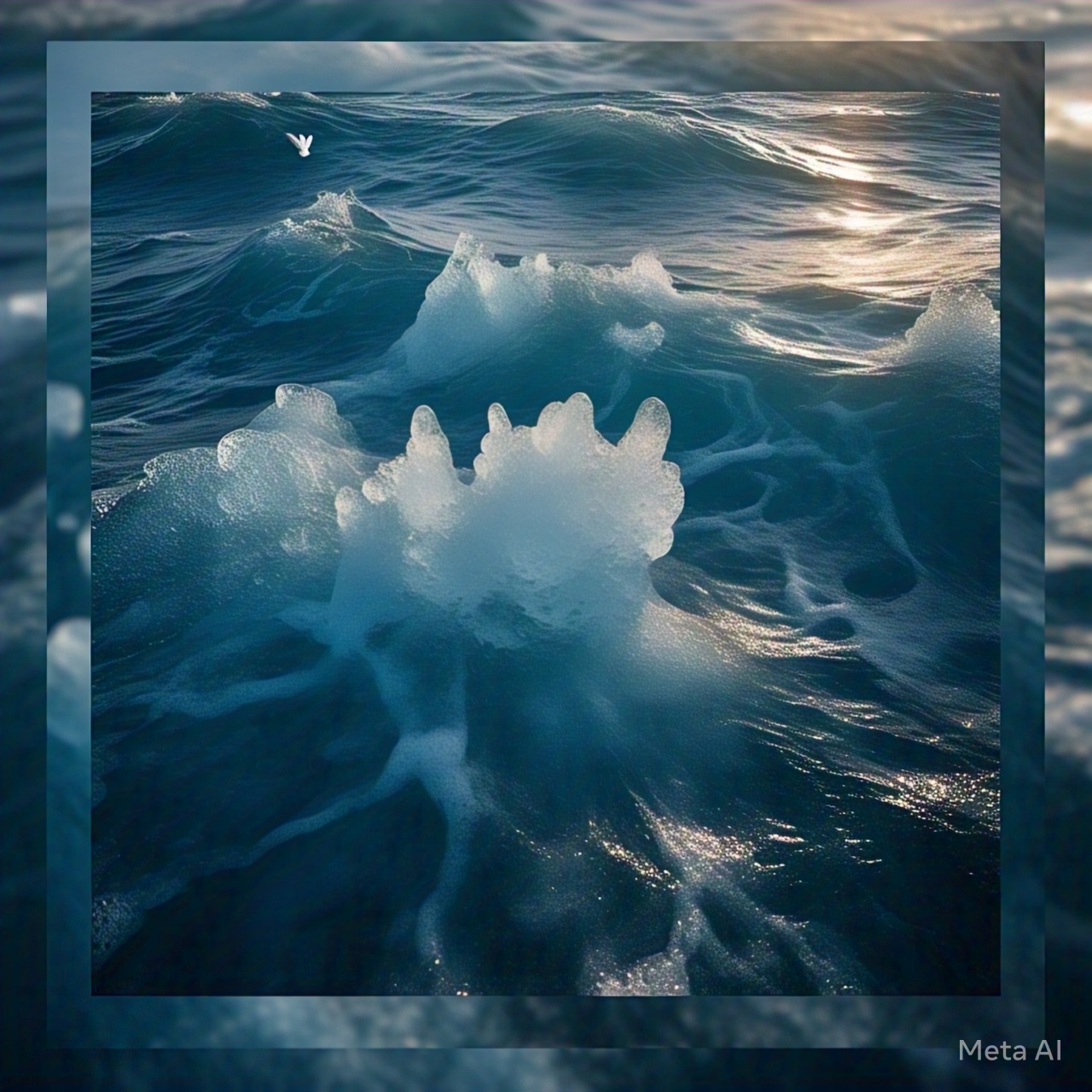
The dawn broke over the frozen landscape, casting the world in a gentle, ethereal glow. Akarith-Seh stood at the edge of the great river, its waters dark and still beneath the ice. The river had always been a place of power for her—a place of connection, a place where the land’s heartbeat was strongest. And today, it called to her.
She stepped forward, her feet crunching in the snow as she moved closer to the river’s edge. The sky above seemed to hold its breath, waiting for something to unfold. It was then that she heard the voice—the deep, resonant hum of the river, rising up from the earth.
The river spoke to her in the ancient language of her people, a language that was not spoken in words but felt in the soul. It was the language of the land, the water, the wind. It was the voice of the deep, the voice of the old world.
Akarith-Seh closed her eyes, her body trembling with the weight of the river’s call. She had always known that the land spoke, but this was something deeper. Something older. Something that transcended time.
It was not a message of peace, but of challenge. The river was calling her to make a choice—a choice that would shape the future of her people. There would be no turning back once the choice was made.
She took a deep breath, feeling the cold air fill her lungs. The voice of the river echoed in her mind, urging her to listen. She could hear the whispers of the elders, the women who had walked this path before her, and their voices melded with the river’s call.
The land is shifting, the river’s voice whispered. The balance is tipping. The world you know is changing, and with it, your place. Will you lead your people into the unknown? Will you walk the path that the land is calling you to follow?
Akarith-Seh’s heart raced. The choice was before her. To lead her people into a future where the old ways might no longer hold, to stand at the forefront of change, or to protect the sacred balance as it was, holding onto what she knew would be a fight for survival.
She was not afraid. She had never been afraid of the unknown, for she had walked with it all her life. But this was different. This was a test—a test of her strength, her wisdom, and her heart.
Her gaze shifted to the sky, to the stars that had always been her guide. They twinkled softly, as if offering their guidance, but the choice was hers alone. The land had spoken. The river had called. Now, the time had come to answer.
Akarith-Seh knelt down by the river, placing her hand on the frozen surface of the water. She could feel the pulse of the world beneath her fingertips, the rhythm of the earth, the steady flow of time. She could feel the weight of the past, the present, and the future pressing upon her.
With a deep breath, she made her decision.
I will lead, she whispered to the river, her voice steady and unwavering. I will walk the path that calls to me, and I will bring my people with me. The world may change, but we will change with it. We will not falter. We will thrive.
As the words left her lips, the river seemed to respond, its waters shifting, as if in approval. The sky above darkened for a moment, and the wind howled, but Akarith-Seh stood strong. She felt the power of the land flow through her, felt the weight of the choice settle deep in her bones.
The river had spoken. The path had been chosen. And now, there was no turning back.
Song 5 – Tha’rahn Vohmar
[Intro]
Tha’rahn sha’kai, lor’mir va’shin,
Ka’rahn to’lan, sha’lith nor’kai.
Se’rith lo’kha, thar’iel vah’nir,
Lohm’arae shai, va’khor tal’nai.
[Verse 1]
Kara’shin voh, ri’ka shaen,
Lo’thar maen, sha’ri tal’bhen.
Shal’nam theris, sha’ra’shai rith,
Isha’lor kha, ka’rith ar’shith.
[Chorus]
Tha’rahn sha’kai, lor’mir va’shin,
Ka’rahn to’lan, sha’lith nor’kai.
Se’rith lo’kha, thar’iel vah’nir,
Lohm’arae shai, va’khor tal’nai.
[Verse 2]
Ka’ne’rak ta’loris, ra’thir vaen,
Wai’ra’ka sho, maer’khal sein.
Ra’kal’nir sei, shai’ther vah,
Lai’thar khe’nai, ri’mar’nal sha.
[Chorus]
Tha’rahn sha’kai, lor’mir va’shin,
Ka’rahn to’lan, sha’lith nor’kai.
Se’rith lo’kha, thar’iel vah’nir,
Lohm’arae shai, va’khor tal’nai.
[Verse 3]
Arshana lorith, sa’lamar vah,
Kara’shira’nel, raekha’rith ta.
Mha’tal’nael, kha’ril’rair shae,
Er’tal’nis sho’rith, ri’ralta kae.
[Chorus]
Tha’rahn sha’kai, lor’mir va’shin,
Ka’rahn to’lan, sha’lith nor’kai.
Se’rith lo’kha, thar’iel vah’nir,
Lohm’arae shai, va’khor tal’nai.
[Verse 4]
Thal’mir kathir, a’khan do’rai,
Sha’kai marash, sha’ra’khan vai.
Vahr’lan tholar, ra’sha tir’sha,
Khal’ra’shan, vi’thor’ra’kha.
[Chorus]
Tha’rahn sha’kai, lor’mir va’shin,
Ka’rahn to’lan, sha’lith nor’kai.
Se’rith lo’kha, thar’iel vah’nir,
Lohm’arae shai, va’khor tal’nai.
[Bridge]
Sha’thir laen, va’karis sho,
Thal’mar ni’sha, sha’lith roh.
Ka’lar va’nir, ri’shon kha,
Lai’ther shai, va’thal mor’na.
[Chorus]
Tha’rahn sha’kai, lor’mir va’shin,
Ka’rahn to’lan, sha’lith nor’kai.
Se’rith lo’kha, thar’iel vah’nir,
Lohm’arae shai, va’khor tal’nai.
[Chorus]
Tha’rahn sha’kai, lor’mir va’shin,
Ka’rahn to’lan, sha’lith nor’kai.
Se’rith lo’kha, thar’iel vah’nir,
Lohm’arae shai, va’khor tal’nai.
[Chorus]
Tha’rahn sha’kai, lor’mir va’shin,
Ka’rahn to’lan, sha’lith nor’kai.
Se’rith lo’kha, thar’iel vah’nir,
Lohm’arae shai, va’khor tal’nai.
[Chorus]
Tha’rahn sha’kai, lor’mir va’shin,
Ka’rahn to’lan, sha’lith nor’kai.
Se’rith lo’kha, thar’iel vah’nir,
Lohm’arae shai, va’khor tal’nai.
[Outro]
Ri’asha va’kai, sha’lith tae,
Ka’laer sha’ra, ta’rihnar sha’nai.
Lar-shai’khor, mi’lae sha’rith kae,
Ra’shin al’ri, ta’shari ta’rith.
Chapter 6: The Final Offering

The winds howled, fierce and unforgiving, as Akarith-Seh stood before the sacred mountain. It had always been there, towering above her people, a silent sentinel, watching over the land. It was a place of power, a place where the old ways had been honored for generations. But now, it was a place of reckoning.
The journey had been long, filled with trials and sacrifices, but she had come to this place not as a girl, but as the leader of her people, the one who would carry the weight of the world. She had chosen the path of change, of transformation, and it had led her here—alone, yet not alone, for the spirit of the land, the wisdom of the ancestors, and the future of her people were with her.
The mountain was silent, but its presence was felt deeply. It was here that she would make the final offering, the offering that would decide the fate of her people. She had walked the path of the river, she had answered its call, but now the land itself would judge her.
She closed her eyes and let the winds fill her lungs, feeling the power of the earth, the sky, and the sea swirling around her. She could hear the whispers of the ancients, the voices of the women who had walked before her, urging her forward. And as she stepped closer to the mountain, her heart began to pound, a rhythm that echoed in the depths of the earth.
At the foot of the mountain, she knelt and placed her hands on the cold stone. It was here, in this sacred place, that she would offer her final sacrifice—the offering of herself. The offering of her love, her strength, and her wisdom. The offering of everything she had been and everything she had yet to become.
The mountain rumbled, as if it were awakening from a long slumber, and the earth trembled beneath her. The winds carried the scent of the sea, the salt of the earth, the sweetness of the fruits long forgotten. And in that moment, she understood.
The offering was not just her body, her life—it was her soul. It was the promise of a new world, a world where her people would walk in harmony with the land, a world where the balance would be restored. But it was also the recognition that the old ways could not survive without change. The future would require sacrifice.
With a final breath, she raised her arms to the sky, offering herself to the land. The wind whipped around her, her hair swirling like the spirals of time itself. The mountain’s voice echoed in the air, ancient and timeless, speaking the words she had longed to hear.
You are the keeper of the flame, the mountain’s voice intoned. You have chosen the path of transformation. Now, the world will change, and you will lead it. The land is with you, and the ancestors walk beside you. Your people will be reborn.
Akarith-Seh lowered her arms, feeling the weight of the mountain’s words settle deep within her soul. She was not just a leader. She was a bridge between the past and the future. She was the flame that would light the way forward. And in that moment, she knew that no matter what the future held, she would face it with the strength of the land, the wisdom of the elders, and the love of her people.
As the winds died down and the mountain fell silent once more, Akarith-Seh stood tall. Her journey had come to an end, but the story was far from over. The future was now in her hands. The people would follow her, and they would walk with her into the unknown. Together, they would forge a new world.
And with that, the final offering was made. The land had accepted her. The journey had begun.
Song 6 – Tha’khorin Vael
[Intro]
Ra’shen vael’kai, lor’mir thara,
Sha’khor tal’nai, ri’shal va’thara.
Al’mir nor’kai, kha’rith shaen,
Tha’khorin lhae, wa’shir va’shen.
[Verse 1]
Sha’rith’kai lothar, thir’kai vah,
Lo’kha ra’nai, sha’ther mar’sha.
Eri’na’sha lorin, kha’mir tal,
Al’tu’ris shae, va’thal rith’nal.
[Chorus]
Ra’shen vael’kai, lor’mir thara,
Sha’khor tal’nai, ri’shal va’thara.
Al’mir nor’kai, kha’rith shaen,
Tha’khorin lhae, wa’shir va’shen.
[Verse 2]
Rithra’shai’ka, saer’tal mir,
Al’mira shora, va’khal ri’shir.
Ar’nith rael, kai’shen mir’sha,
Ka’rit’na’shka, al’shinar tha.
[Chorus]
Ra’shen vael’kai, lor’mir thara,
Sha’khor tal’nai, ri’shal va’thara.
Al’mir nor’kai, kha’rith shaen,
Tha’khorin lhae, wa’shir va’shen.
[Verse 3]
Ra’vaar’niya, a’khor thal’kai,
Rekhan shara, ra’kai ar’vai.
Sha’na’rith kha’lor, thah’ris maer,
Luin’khor va’thar, er’wai shaen.
[Chorus]
Ra’shen vael’kai, lor’mir thara,
Sha’khor tal’nai, ri’shal va’thara.
Al’mir nor’kai, kha’rith shaen,
Tha’khorin lhae, wa’shir va’shen.
[Verse 4]
Shal’mar’erth, sha’rinor vael,
Ra’vath’kai nishal, ra’shin mir’tel.
Sa’khorin vatha, sha’ra’vath nor,
Ra’khaler toshak, la’ka’var tor.
[Chorus]
Ra’shen vael’kai, lor’mir thara,
Sha’khor tal’nai, ri’shal va’thara.
Al’mir nor’kai, kha’rith shaen,
Tha’khorin lhae, wa’shir va’shen.
[Bridge]
Va’shir khael, sha’thir taen,
Thal’mir ka’ron, va’thal ri’shen.
Kha’rith loren, sha’kai vael,
Tha’ran nor’kha, sha’thir kael.
[Chorus]
Ra’shen vael’kai, lor’mir thara,
Sha’khor tal’nai, ri’shal va’thara.
Al’mir nor’kai, kha’rith shaen,
Tha’khorin lhae, wa’shir va’shen.
[Outro]
Er’wan si’khor, ra’vath’al’rin,
Lai’mar kha’shin, na’shal’kirin.
Ra’khorin thal’kin, khora’shin ris,
Thal’na’she’er, ka’sha’rithris.
The Song of Arikai: An Antarkh Woman’s Journey with Orchestra Americana
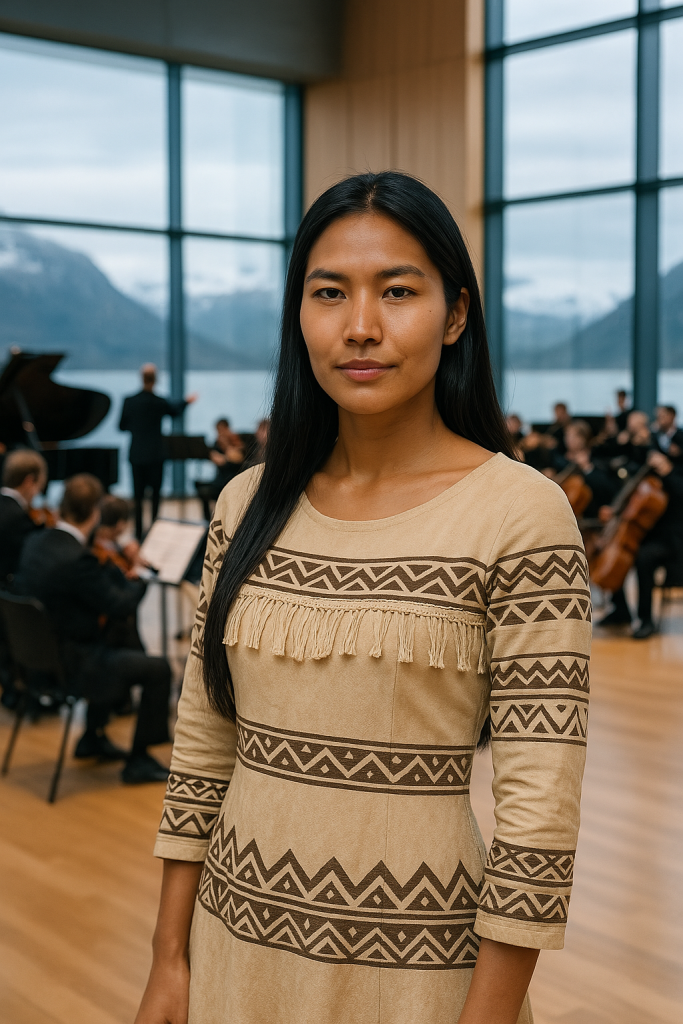
Arikai stood at the edge of the frozen sea, the wind threading through her silvered braids like a weaver working an eternal loom. She had heard stories of the old world—the lost melodies of Antarkh that once echoed across the ice—songs that had been swallowed by time, as had many voices from her land. Yet, standing here beneath a sky bursting with the colors of the southern aurora, she felt a stirring deep within her bones. A call. A memory. A promise.
It was this call that led her to TATANKA’s Orchestra Americana, an ensemble unlike any she had ever known. They were travelers of sound, bridging the continents with notes and rhythms that did not recognize borders. When she first heard their performance over the wind-borne radio waves of her settlement, she felt something awaken within her—a longing, an urgency to reclaim something that had nearly been forgotten.
Arikai’s people, the Antarkh, had always been guardians of tradition, their songs passed down in whispers and hums, hidden within the ice’s crevices. Yet, the world had changed, and the voices of the past had grown faint. So when TATANKA’s invitation arrived—a call for those who wished to weave their ancestral sounds into a new musical tapestry—Arikai knew she could not ignore it. She journeyed across the frozen expanse to meet them, heart pounding in time with the pulse of a song yet to be sung.
At the heart of the Orchestra Americana stood a conductor unlike any other, a visionary who saw music as a conversation between time and cultures. He listened as Arikai sang for him, her voice weathered by wind and wisdom. Her song was the lament of the ice, the hymn of endurance, the dance of survival. And instead of nodding in polite appreciation, he asked, “How can we help tell your story?”
For weeks, Arikai worked alongside musicians from across the world. She taught them the ancient rhythms of Antarkh, how the beat of the drum mimicked the cracking of glaciers, how the flute sang like the wind through ice tunnels. In turn, they shared their own sounds—guitars that wept and laughed, violins that soared, voices that wove harmonies she had never imagined. Together, they crafted something new: a symphony of resilience.
When the night of the performance arrived, Arikai stood at the center of the stage, her heart pounding. Before her, an audience from every corner of the world waited in silence. Then, as the first note trembled through the air, she closed her eyes and let the song take her. It was not just hers; it was the voice of her ancestors, the whispers of the frozen land, the story of Antarkh reborn through Orchestra Americana.
The music swelled, and the audience was no longer mere spectators—they were travelers, moving through the vast ice fields, feeling the weight of history and the lightness of hope. Arikai saw the wonder in their eyes, the way they leaned forward, breathing in every note. In that moment, she knew: Antarkh’s song would never be lost again.
As the final note faded into the silence, the applause was thunderous, a wave crashing over her. Strangers embraced her, voices mingling in praise, but more than that, in understanding. Arikai realized she had not just shared her people’s music—she had given them a bridge to a world they had never known, and in turn, they had welcomed her sound into theirs.
When she returned to her homeland, she did not come empty-handed. She brought with her recordings, stories, and most importantly, a rekindled fire of inspiration. The young ones gathered around her, eager to learn, eager to add their own voices to the growing symphony. Antarkh would sing again—not as a whisper, but as a roar.
Takeaway: Arikai’s journey with Orchestra Americana is a testament to the power of collaboration, the beauty of cultural exchange, and the resilience of heritage. In a world that often forgets the voices of the past, it is through music and shared experiences that we can revive lost stories and forge new ones.
Through her experience, we learn that tradition is not something to be locked away in history; rather, it is a living, breathing force that grows stronger when shared. Arikai did not simply preserve her people’s song—she set it free, ensuring that the echoes of Antarkh would forever resonate across the world.
🧊 Akarith-Seh: An Antarctic Story of Ice, Flame, and Balance
The provided text centers around TATANKA and their project “An Antarctic Story – Akarith-Seh: The Keeper of the Flame,” a concept album or musical narrative set in a pre-ice Antarctica. It tells the story of the People of Antarkh, their matriarchal society focused on balance with nature, and their leader Akarith-Seh as she guides them through the coming ice age. The text outlines her journey, spiritual beliefs, language, and the eventual fall of their civilization, alongside song lyrics from the album. Additionally, it describes Arikai, a modern descendant who collaborates with TATANKA’s Orchestra Americana to revive the lost songs of her ancestors, showcasing themes of cultural preservation and resilience through music. The website also provides information about TATANKA’s broader mission and related musical projects.
Briefing Document: An Antarctic Story – Akarith-Seh: The Keeper of the Flame
Overview:
This document summarizes the main themes, important ideas, and facts presented in the provided excerpts from TATANKA’s “An Antarctic Story – Akarith-Seh: The Keeper of the Flame.” This narrative, described as “(AI Gen) TATANKA’s Akarith-Seh: The Keeper of the Flame,” tells the story of a lost civilization called the People of Antarkh who once thrived in Antarctica before it became a frozen wasteland. The excerpts introduce the matriarchal society of Antarkh, their deep connection to nature and balance, their spiritual beliefs, the coming of the ice age, and the journey of their leader, Akarith-Seh, as she guides her people through this cataclysmic shift. The narrative emphasizes themes of reverence for the Earth, the cyclical nature of time, the power of matriarchal leadership, and the enduring strength of love and community in the face of environmental change. The inclusion of song lyrics (in a fictional language, Akaarith) further immerses the reader in the culture and emotions of the Antarkh people. The final section details the collaboration of a modern-day descendant of the Antarkh, Arikai, with TATANKA’s Orchestra Americana, highlighting the power of music to preserve and revive lost heritage.
Main Themes and Important Ideas:
- Reverence for the Earth and Balance: The core belief system of the People of Antarkh revolves around maintaining balance between elemental forces like fire and ice, sun and shadow. They venerated the Earth as sacred and lived in harmony with nature, “never taking more than was given.” This resonates with the quote from Karen Armstrong cited at the beginning: “We need myths that help us to venerate the earth as sacred once again, instead of merely using it as a ‘resource.’” This highlights a central message of the narrative – the importance of a respectful and symbiotic relationship with the environment.
- Matriarchal Leadership and Wisdom: The society of Antarkh is explicitly described as matriarchal, with women as “the keepers of wisdom, the seers of the stars.” Matriarchs like Akarith-Seh hold significant power and guide their people based on ancient wisdom and a deep understanding of the natural world. The narrative emphasizes the strength, intuition, and nurturing qualities associated with this leadership. Notably, in their relationships, “Women did not take men’s names. Men took names chosen by the woman,” further illustrating the power dynamics within their society.
- The Cyclical Nature of Time and Rebirth: The Antarkh believed in a non-linear, spiral concept of existence, symbolized by circular patterns. They saw the coming ice age not as a final end, but as part of a larger cosmic cycle where “the deep ice held the wisdom of the past, a slumbering memory that one day would awaken again.” This provides a framework for understanding loss and endurance within their story.
- Love as Reverence and Cosmic Force: The narrative portrays love within the Antarkh culture as something beyond possession or ownership. As the women said, “You are mine, but not as something kept. You are mine as the river is the land’s, as the wind belongs to the open sky. You move freely, you provide, you protect, you love me. But you love the world and the stars, which flowed through us all.” This concept of love as a force connected to the larger universe underscores their holistic worldview.
- The Inevitable Change and the Need for Adaptation: The story depicts the slow but relentless encroachment of the ice age (“The Long Twilight”) as an “eternal storm” that forces the People of Antarkh to confront the limits of their world. Akarith-Seh’s journey becomes one of accepting this change and leading her people towards an uncertain future, highlighting the theme of adaptation in the face of environmental crisis.
- The Significance of Mythology and Ancestral Knowledge: The Antarkh culture is rich in mythology, explaining their origins and their role as caretakers of balance. Their knowledge, recorded on “Pillars of the Sky,” and the wisdom of their shamans (“The Veil-Walkers”) who commune with “The Frozen Gods,” play a crucial role in guiding their decisions during the impending ice age.
- Akarith-Seh as a Transformative Leader: Akarith-Seh is presented not merely as a ruler but as a “vessel” for her people, embodying their culture and tasked with preserving it. Her journey involves personal transformation, loss, and profound connection to the spiritual and natural realms. Her symbolic attributes, such as the “Third Eye” representing inner vision and the “Garment woven from the fibers of the invisible realms,” emphasize her unique connection to higher knowledge and cosmic energies.
- Kaelith-Tor as the Loyal Protector and Balance: Akarith-Seh’s mate, Kaelith-Tor, embodies unwavering loyalty and provides essential support to her leadership. His name itself (“Hunter of the Lost Paths,” “immovable, unshaken”) signifies his role. Akarith-Seh’s words to him, “You are not just my mate, Kaelith-Tor. You are the spear’s edge, the prow that cuts the ice, the silent watcher at the edge of the firelight,” highlight his strength and dedication to her vision.
- Enduring Legacy and the Power of Storytelling: Even as the civilization of Antarkh faces its fall, the narrative emphasizes the importance of preserving their memory. Akarith-Seh writing the “final glyph on the last Pillar of the Sky” and the idea that “the winds… carry her people’s memory into the future” underscore the power of stories and symbols to transcend time.
- Cultural Revival Through Music: Arikai’s Story: The concluding section shifts to the present day (or near future, 2025), introducing Arikai, a descendant of the Antarkh. Her collaboration with TATANKA’s Orchestra Americana showcases the potential for music to bridge cultural divides and revive lost heritage. Arikai’s sharing of her people’s “ancient rhythms” and the creation of a “symphony of resilience” demonstrate how tradition can be a “living, breathing force that grows stronger when shared.”
Key Facts and Details:
- The story is set in Antarctica before it was completely covered in ice.
- The civilization is called the People of Antarkh.
- Their society is matriarchal.
- Akarith-Seh is the last great matriarch and the central figure of the narrative.
- They believed in maintaining balance between fire and ice and revered the cold.
- Their spiritual leaders were called The Veil-Walkers, who sought wisdom from The Frozen Gods.
- The coming of an ice age (“The Long Twilight”) forces them to seek refuge.
- They spoke a language called Akaarith, used in the album’s song lyrics.
- Their symbols were circular, representing cyclical time.
- The narrative follows Akarith-Seh’s journey of leadership, loss, and the search for a “Last Sanctum.”
- The “Pillars of the Sky” were monoliths containing their cosmic knowledge.
- Arikai, a modern-day descendant, collaborates with Orchestra Americana to share the music and story of Antarkh.
Quotes:
- “We need myths that help us to venerate the earth as sacred once again, instead of merely using it as a ‘resource.’” – Karen Armstrong
- “You are mine, but not as something kept. You are mine as the river is the land’s, as the wind belongs to the open sky. You move freely, you provide, you protect, you love me. But you love the world and the stars, which flowed through us all.” (Describing the Antarkh concept of love)
- “You are not just my mate, Kaelith-Tor. You are the spear’s edge, the prow that cuts the ice, the silent watcher at the edge of the firelight.” – Akarith-Seh to Kaelith-Tor
Conclusion:
The excerpts from “An Antarctic Story – Akarith-Seh: The Keeper of the Flame” present a compelling narrative that blends elements of mythology, historical fiction, and spiritual themes. It explores the profound connection between humanity and the environment, the strengths of matriarchal leadership, and the enduring power of cultural memory. Through the story of the People of Antarkh and the modern-day efforts of Arikai, the narrative encourages a renewed sense of reverence for the Earth and highlights the vital role of storytelling and artistic expression in preserving and revitalizing cultural heritage. The inclusion of song lyrics further enriches the experience, offering a glimpse into the language and emotional landscape of this lost civilization.
Frequently Asked Questions about “An Antarctic Story – Akarith-Seh: The Keeper of the Flame”
What is the overarching message or takeaway from the story of Akarith-Seh and the Antarkh? The story emphasizes the importance of balance, reverence for the Earth, the endurance of culture and memory in the face of great change, and the power of leadership rooted in wisdom and connection to the past. It suggests that even in loss and the face of environmental shifts, the spirit of a people and their stories can persist. The integration of Arikai’s story further highlights the potential for cultural revival and the power of collaboration in keeping ancestral voices alive.
Who were the People of Antarkh, and what was their connection to Antarctica? The People of Antarkh were a civilization that flourished in Antarctica before it became a frozen wasteland. They believed themselves to be the keepers of balance between fire and ice, sun and shadow, and lived in harmony with the land. Their culture revered nature and was deeply spiritual, with knowledge passed down through generations, particularly by the matriarchs. The land of Antarctica, even in its frozen state, holds the memory of their existence.
Who is Akarith-Seh, and what is her role in the story? Akarith-Seh is the last great matriarch of the People of Antarkh. Her journey is central to the narrative and embodies themes of transformation, loss, discovery, and rebirth. She is portrayed as a vessel for her people, carrying the weight of their culture and the responsibility of preserving their heritage as the ice encroaches upon their land. Her leadership guides her people through the coming challenges, seeking a way for their traditions and spirit to endure.
What were some key aspects of the Antarkhian culture and beliefs? The Antarkhians had a deep reverence for nature and believed in maintaining a sacred balance between opposing forces. Their society was structured around the wisdom of women (matriarchs) and a non-possessive understanding of love and relationships. They revered the cold and believed the ice held the wisdom of the past. Their spiritual leaders, the Veil-Walkers, sought knowledge from beings within the ice called the Frozen Gods. Their understanding of time was cyclical, represented by circular symbols and their language, Akaarith, was both spoken and sung.
What were the “Pillars of the Sky” and their significance? The Pillars of the Sky were towering monoliths carved with intricate glyphs that served as records of the Antarkhians’ cosmic knowledge and history. They were central to their civilization and understanding of the world, acting as physical and symbolic anchors for their cultural memory and connection to the cosmos. Akarith-Seh writing the final glyph on the last Pillar signifies her commitment to ensuring her people’s story would not be forgotten.
Who is Kaelith-Tor, and what does his relationship with Akarith-Seh represent? Kaelith-Tor is Akarith-Seh’s chosen mate and a dedicated warrior. His name signifies his role as the “Hunter of the Lost Paths” and “immovable” protector. Their relationship embodies the Antarkhian understanding of love as reverence and harmony, not ownership. He is a steadfast supporter of Akarith-Seh’s leadership, representing a balance of strength and unwavering faith in her wisdom and path.
What is the significance of the “third eye,” the pendants, and the garment associated with Akarith-Seh? These symbolic representations highlight Akarith-Seh’s spiritual depth and connection to universal forces. The third eye symbolizes inner vision, intuition, and the ability to perceive truths beyond the physical realm. The pendants represent the essence of teachings and powers passed down through generations, embodying the interconnectedness of the universe’s elements and ancestral wisdom. Her garment, woven from “invisible realms,” signifies her role as a conduit for cosmic truth and a being who can move between dimensions.
What is the “Great Change” or “Long Twilight” that the People of Antarkh faced? The Great Change, also referred to as the Long Twilight, signifies the gradual but inevitable encroachment of the ice upon the land of Antarkh. This period represents a significant trial for their civilization, leading to the decline of their warmer world and the eventual need to seek refuge beneath the ice. It is the driving force behind Akarith-Seh’s leadership and the central conflict of the story.
Study Guide: An Antarctic Story – Akarith-Seh: The Keeper of the Flame
Quiz
Answer the following questions in 2-3 sentences each.
- Who were the People of Antarkh, and what was their core belief system?
- Describe the role of Akarith-Seh within her society as depicted in the early chapters.
- What are the “First Signs” mentioned in the text, and how did the younger generation react to them?
- Explain the significance of Kaelith-Tor in Akarith-Seh’s life and within their culture.
- What is the “Way” as described by the elders, and what does it entail for Akarith-Seh?
- Describe the “calling of the deep waters” and the choice it presented to Akarith-Seh.
- What was the “final offering” Akarith-Seh made at the sacred mountain, and what did it signify?
- Who is Arikai, and what motivates her journey to Orchestra Americana?
- How does Arikai collaborate with Orchestra Americana, and what is the result of their collaboration?
- What is the central takeaway message from Arikai’s experience with Orchestra Americana?
Quiz Answer Key
- The People of Antarkh were an ancient civilization that flourished in Antarctica before it became completely ice-covered. Their core belief system centered around maintaining the balance between fire and ice, sun and shadow, and they saw themselves as the caretakers of this harmony.
- In the early chapters, Akarith-Seh is portrayed as a young but wise apprentice to the shamans and a close pupil of her mother, the high matriarch and keeper of stories. She is marked by the spirits as a future leader and possesses a deep understanding of the “heart” and the balance within her people.
- The “First Signs” were subtle shifts in the stars that forewarned the coming ice and the Great Change. While the elders recognized their significance as prophecies, the younger generation, eager for the future, tended to dismiss them as old wives’ tales.
- Kaelith-Tor is Akarith-Seh’s chosen mate and is depicted as a strong and loyal warrior who provides unwavering support and protection. His role reflects the Antarkhian understanding of love as reverence and devotion as harmony, with men taking names chosen by women.
- The “Way,” as described by the elders, is not a physical path but a fundamental pulse, rhythm, and song of the Earth itself. To walk the Way means to deeply listen and understand the world’s desires, pains, and joys, living in harmony with nature.
- The “calling of the deep waters” is the river speaking to Akarith-Seh in the ancient language, presenting her with a profound challenge. It forces her to choose whether to lead her people into an uncertain future of change or to try and preserve the old ways in the face of the encroaching ice.
- The “final offering” Akarith-Seh made at the sacred mountain was the offering of herself, her love, strength, wisdom, and soul to the land. This symbolized her commitment to leading her people through transformation and restoring balance to the world, acknowledging the necessity of change.
- Arikai is a woman from the present-day Antarkh community who has heard stories of her ancestors’ lost melodies. She is motivated by a deep stirring within her to reclaim these forgotten songs and connect with her heritage, leading her to seek out TATANKA’s Orchestra Americana.
- Arikai collaborates with Orchestra Americana by teaching them the ancient rhythms and sounds of Antarkh, such as drum beats mimicking glacial cracking and flutes sounding like wind through ice tunnels. In return, they share their diverse musical traditions, creating a new symphony of resilience that blends ancient and contemporary sounds.
- The central takeaway from Arikai’s experience is the power of collaboration and cultural exchange in preserving and revitalizing heritage. It demonstrates that tradition is a living force that strengthens when shared, allowing lost stories and melodies to be reborn and resonate across the world.
Essay Format Questions
- Analyze the significance of the matriarchal structure in the society of the People of Antarkh as depicted in the excerpts. How does this structure influence leadership, relationships, and their spiritual beliefs?
- Discuss the symbolism of ice and fire in the narrative of Akarith-Seh. How do these elements shape the Antarkhian worldview, their mythology, and the challenges they face?
- Explore the concept of “balance” as it is presented in the story of Akarith-Seh. How does this principle govern the Antarkhian way of life, their relationship with nature, and Akarith-Seh’s leadership decisions?
- Compare and contrast the role of tradition and the necessity of change in the stories of Akarith-Seh and Arikai. How do these two figures navigate the preservation of their heritage in the face of shifting circumstances?
- Examine the power of music and storytelling as tools for cultural preservation and connection in the provided excerpts. How do the songs and narratives within the text contribute to the understanding and survival of the Antarkhian legacy?
Glossary of Key Terms
TATANKA: The organization or project under which this story and musical work are presented, seemingly focused on themes of indigenous wisdom, balance, and cultural preservation.
Antarkh: The name of the land in Antarctica before it was completely covered in ice, and the name of the civilization that inhabited it.
Akarith-Seh: The last great matriarch of the People of Antarkh, known as “The Keeper of the Flame,” who leads her people through a time of great change.
People of Antarkh: The ancient civilization that flourished in Antarctica, believing themselves to be keepers of balance between elemental forces.
Matriarch: A female leader in a society where power and social organization are centered on women. The women of Antarkh were the keepers of wisdom and held significant leadership roles.
Kaelith-Tor: Akarith-Seh’s chosen mate, depicted as a strong and loyal warrior who embodies the Antarkhian understanding of devotion and support.
Frozen Gods: Beings of ice and shadow revered by the Antarkhians, believed to hold the wisdom of the past within the deep ice. Their shamans, the Veil-Walkers, sought knowledge from them.
The Long Twilight: A legendary period marking the beginning of the ice age in Antarkh, when the sun grew distant and the land was engulfed in an eternal storm.
The Last Sanctum: A hidden refuge beneath the ice where some of the Antarkhian sages were believed to have ventured during the Long Twilight.
Pillars of the Sky: Towering monoliths carved with glyphs that recorded the cosmic knowledge of the People of Antarkh.
The Way: Not a physical path, but the fundamental pulse, rhythm, and song of the Earth, representing the interconnectedness and balance of all things.
Tirna’Aka: The name of Song 1, likely a significant concept or phrase within the Akaarith language related to unity or the land.
Kethra’Rahn: The name appearing in Songs 2 and 3, possibly referring to a sacred flame, tradition, or a connection to the elders and ancients.
Tza’karis Vohna: The title of Song 4, the meaning of which is not explicitly defined but suggests a particular theme or moment in the narrative.
Tha’rahn Vohmar: The title of Song 5, the meaning of which is not explicitly defined but suggests a particular theme or moment in the narrative.
Tha’khorin Vael: The title of Song 6, possibly relating to a final offering or a significant conclusion in Akarith-Seh’s journey.
Arikai: A contemporary descendant of the People of Antarkh who seeks to revive the lost musical traditions of her ancestors through collaboration with Orchestra Americana.
Orchestra Americana: A musical ensemble that TATANKA connects with various cultural traditions to create new musical tapestries.

